Planning a weekend in New Orleans? We got you! Here’s the perfect 2-3 day itinerary for your first visit to the Big Easy.
Most tourists associate New Orleans with Mardi Gras, jazz, Cafe du Monde’s beignets, and Cajun/Creole food, but the city has so much more to offer. On our most recent trip, we discovered some fun outdoor adventures too!
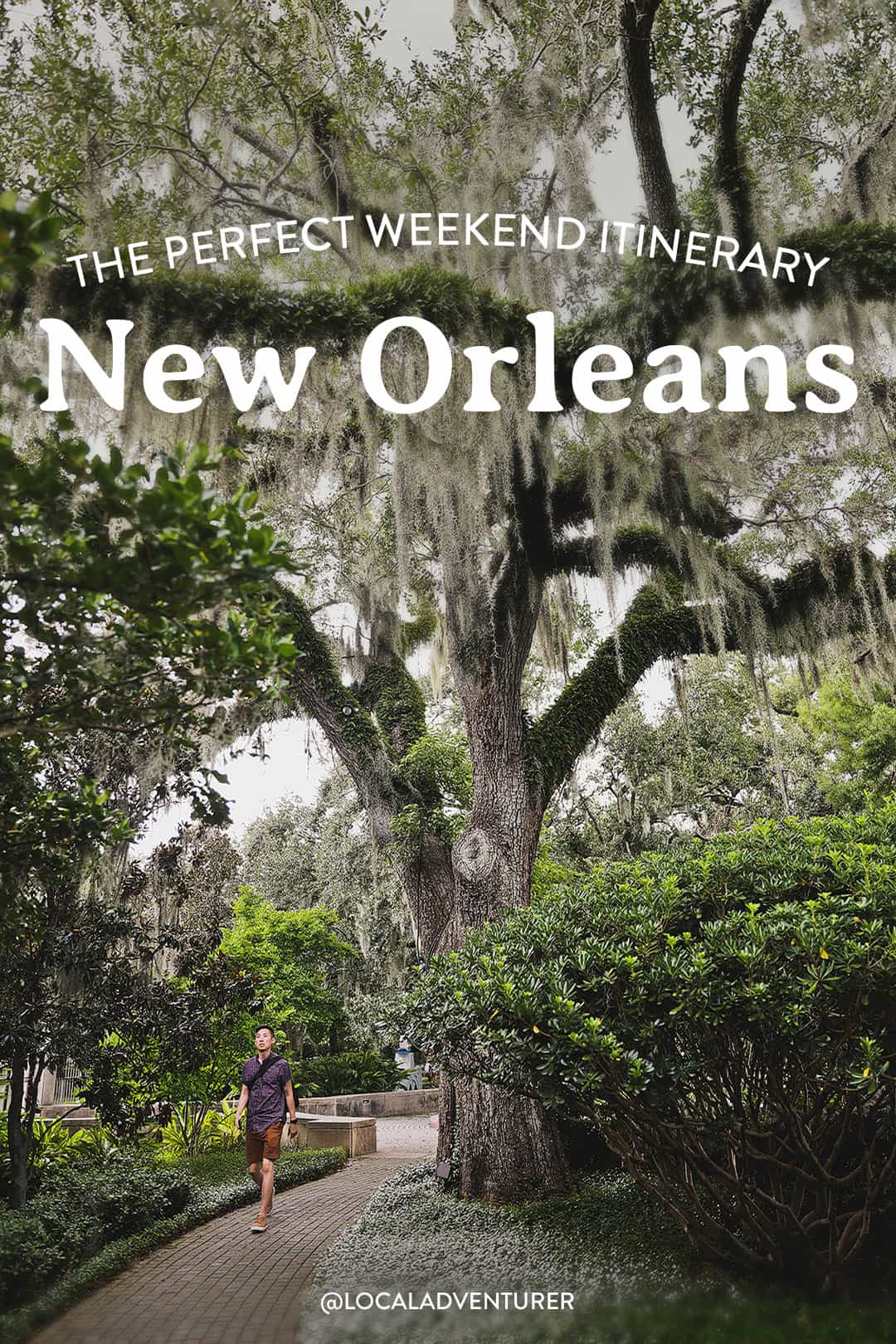
This post is written in partnership with New Orleans & Company, however all opinions are our own. It may contain affiliate links, where we receive a small commission on sales of the products that are linked at no additional cost to you. Read our full disclosure for more info. Thank you for supporting the brands that make Local Adventurer possible.
Last Updated: June 9, 2025
Why Visit New Orleans?
New Orleans is a must-visit city if you’re into jazz, cocktails, food, or history. Most people know its nickname, the Big Easy, but it’s also called Crescent City because of its location at a sharp bend in the Mississippi River.
You can find jazz culture, live music around every corner, and beautiful 17th-century architecture with French and Spanish Creole influences.
What is new Orleans Known For
- Mardi Gras
- Jazz and Live Music
- Cajun and Creole Food
- 17th-Century Architecture
- The Bayou / Swamp
- Nightlife
- Ghost Tours
- Voodoo
- Cemeteries
New Orleans Neighborhoods to Visit
- French Quarter – This area has most of the major tourist attractions like Cafe du Monde, French Market, Jackson Square, and Bourbon Street.
- Uptown/Garden District – Home to Audubon Park, beautiful mansions, Commander’s Palace, and Lafayette Cemetery No. 1.
- Central Business District is where we stayed. You’ll also find Vue Orleans, The National WWII Museum, and popular restaurants among food lovers like Peche.
- City Park – The park has been New Orleans’ largest outdoor attraction since 1854 and is 1.5x the size of Central Park.
- Marigny/Bywater – Has a vibrant art scene, and it’s where the cool kids hang out. They have the best live music venues on Frenchmen Street and unique art galleries and eateries. Some people call it the “hipster” neighborhood.
How to Spend a Weekend in New Orleans
Day 1: Tourist Attractions
As much as seasoned travelers like to say they want to travel like the locals, most tourist attractions are there for a reason. On day 1, we like to knock out as many touristy things as possible to have more flexibility to wander later on in the trip. I know this is a sizeable list for the first day, but many of these are close to each other and quick stops.
1. New Orleans School of Cooking Class
524 St Louis St, New Orleans, LA 70130, map
Though I wouldn’t lump this with all the typical tourist attractions, doing this first will give you a greater appreciation for everything else you eat and do on your trip.
Oh, did we mention that you get bottomless drinks? They had wine, beer, mimosas, and bloody marys. It was a fun way to start the day but a bit dangerous for those of us (me!) with little to no self-control.
This was our first cooking class, and the instructor taught us new cooking skills and gave us insight into Cajun/Creole cuisine and history. You can also ask them for all the food recs.
We got a chance to make popular local dishes like Seafood and Okra Gumbo, Crawfish Pie, and Banana Foster Crepes. At the end of the class, you get to keep the recipes and aprons you cook in as souvenirs.
If you don’t have time for a hands-on cooking class, there are demonstration classes where you can watch the chefs cook and then eat what they make.
Local Tip: You can watch them make fresh pralines at the front of the store, and they hand out samples. We picked up a couple of boxes as souvenirs for friends! You don’t need a class for these.
Alternative: If you don’t have time for a cooking class, grab lunch at Peche. We especially loved their Fried Bread and Spicy Ground Shrimp + Noodles.
See More: 49 Best Places to Eat in New Orleans


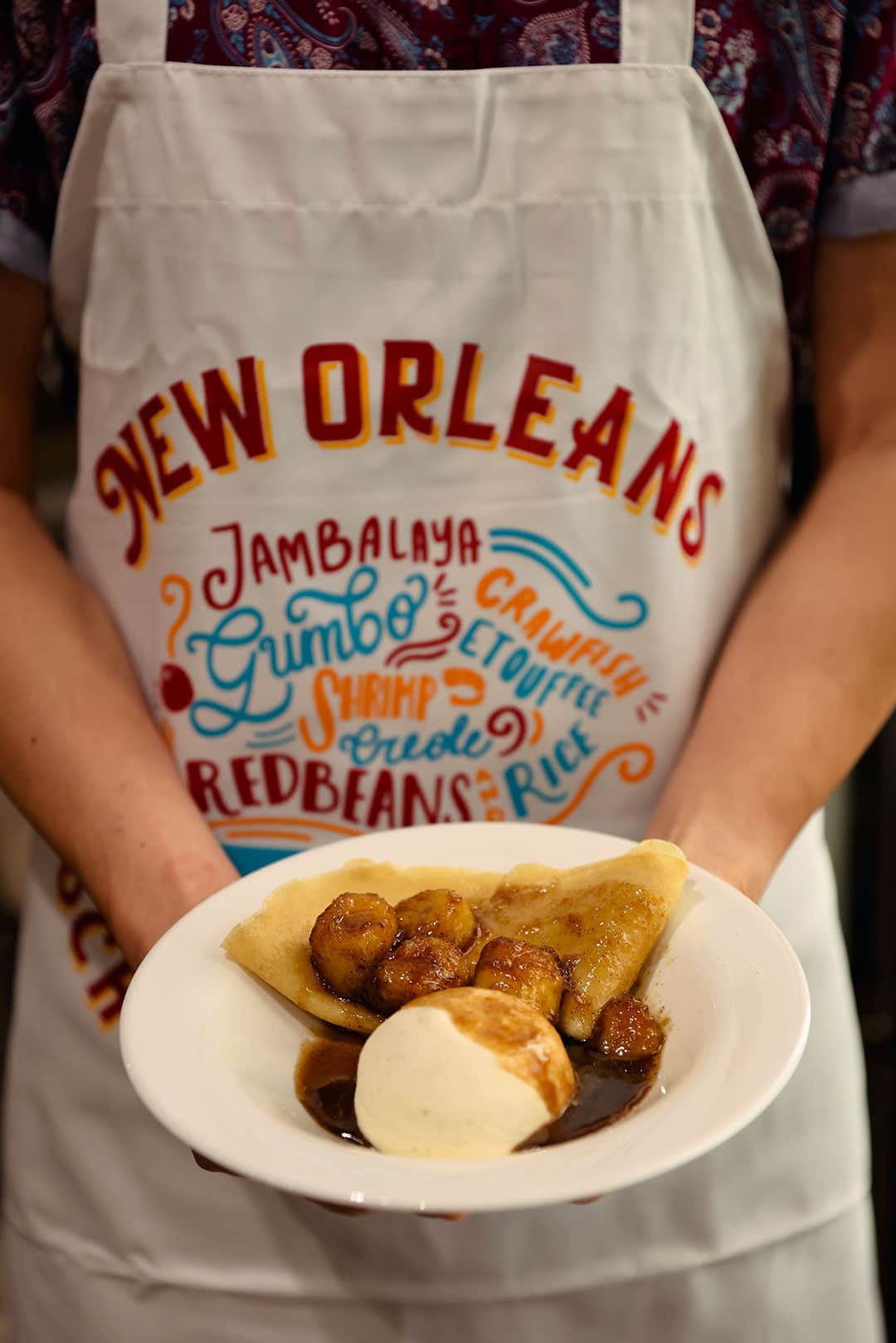
2. New Orleans Jazz National Historical Park and Jean Lafitte National Historical Park
419 Decatur St, New Orleans, LA 70130, map
We love exploring National Park units and filling up our National Park Passport, so when we discovered that there are two units in New Orleans, we had to stop by. Google Maps will show you a different address for New Orleans Jazz National Historical Park, but now they share a space with Jean Lafitte National Historical Park. Two in one visit! It’s also really close to the cooking class.
Jean Lafitte National Historical Park has several sites outside of the city, but this is the visitor center. I always do the Junior Ranger program even though it’s technically for kids (kid at heart, right?). It’s an easy way to learn about the area. Just look for a ranger and ask for a packet. After finishing them, you earn a pin/badge.
Fun Fact: Did you know many of the park rangers and volunteers here are jazz musicians too? They have some ranger talks as well as free jazz performances held at the New Orleans Jazz Museum.
Note: The New Orleans Jazz Museum is not part of the National Park unit and has an additional fee if you want to explore the museum outside of the free performance.
See More: Your Complete List of All National Parks in the US
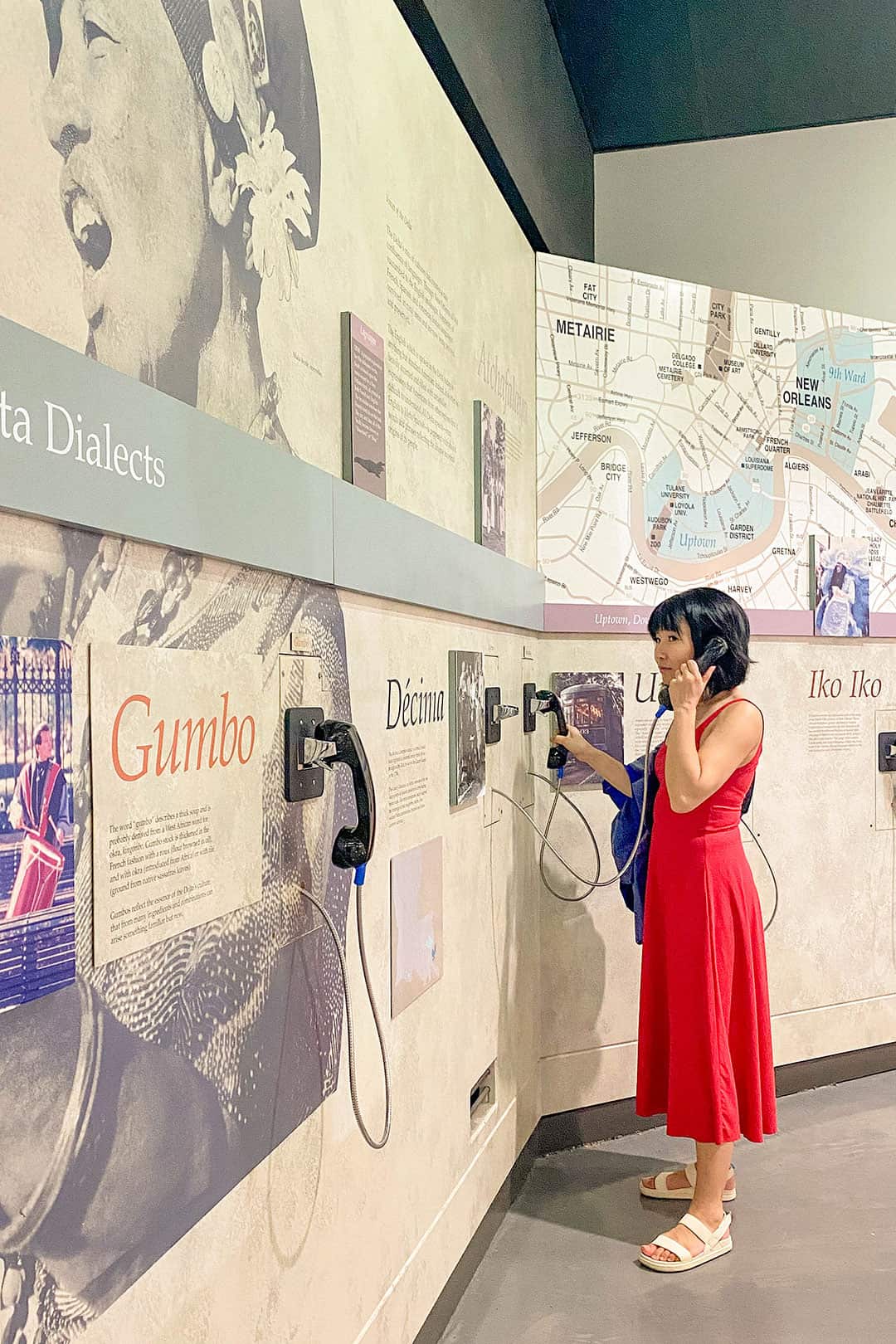
3. Get Beignets at Cafe Du Monde
800 Decatur St, New Orleans, LA 70116, map
There’s always room for beignets. Beignets have become synonymous with New Orleans, and Cafe du Monde is the most popular place to get them. They keep it simple and serve coffee and chicory and beignets. The interior was closed during our visit, so we ordered and grabbed a table outside, which was perfect for watching the local street musicians.
The beignets at the original location weren’t the freshest or warmest (although we hear that’s not the norm), so if we had to do it again, we would visit the original spot for some photos but then get beignets at any of their other locations. We saw them making beignets at the City Park location, which looked fresh. Plus, on hot days, they have indoor seating with AC.
Some locals will argue Cafe Beignet has the best beignets. Next time, we’ll have to do a side-by-side comparison.
Local Tip: Everyone will tell you the beignet mix makes for the best gift, but you can buy them at grocery stores nationwide. You should get the ones made at the airport location or pick up freshly-made pralines.
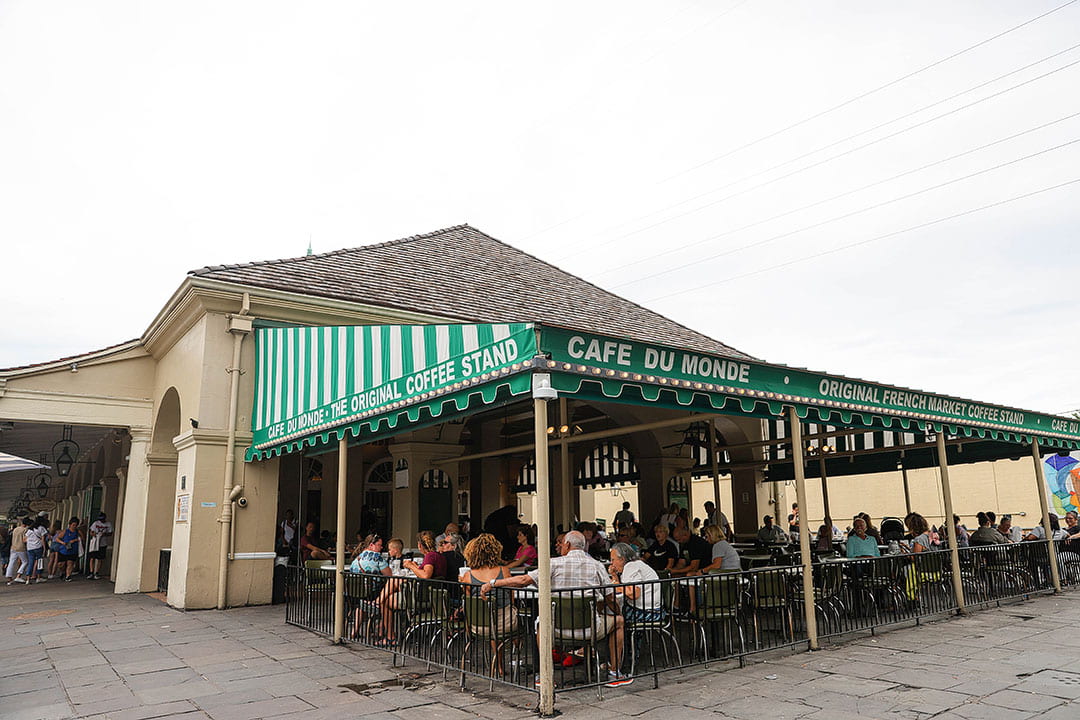
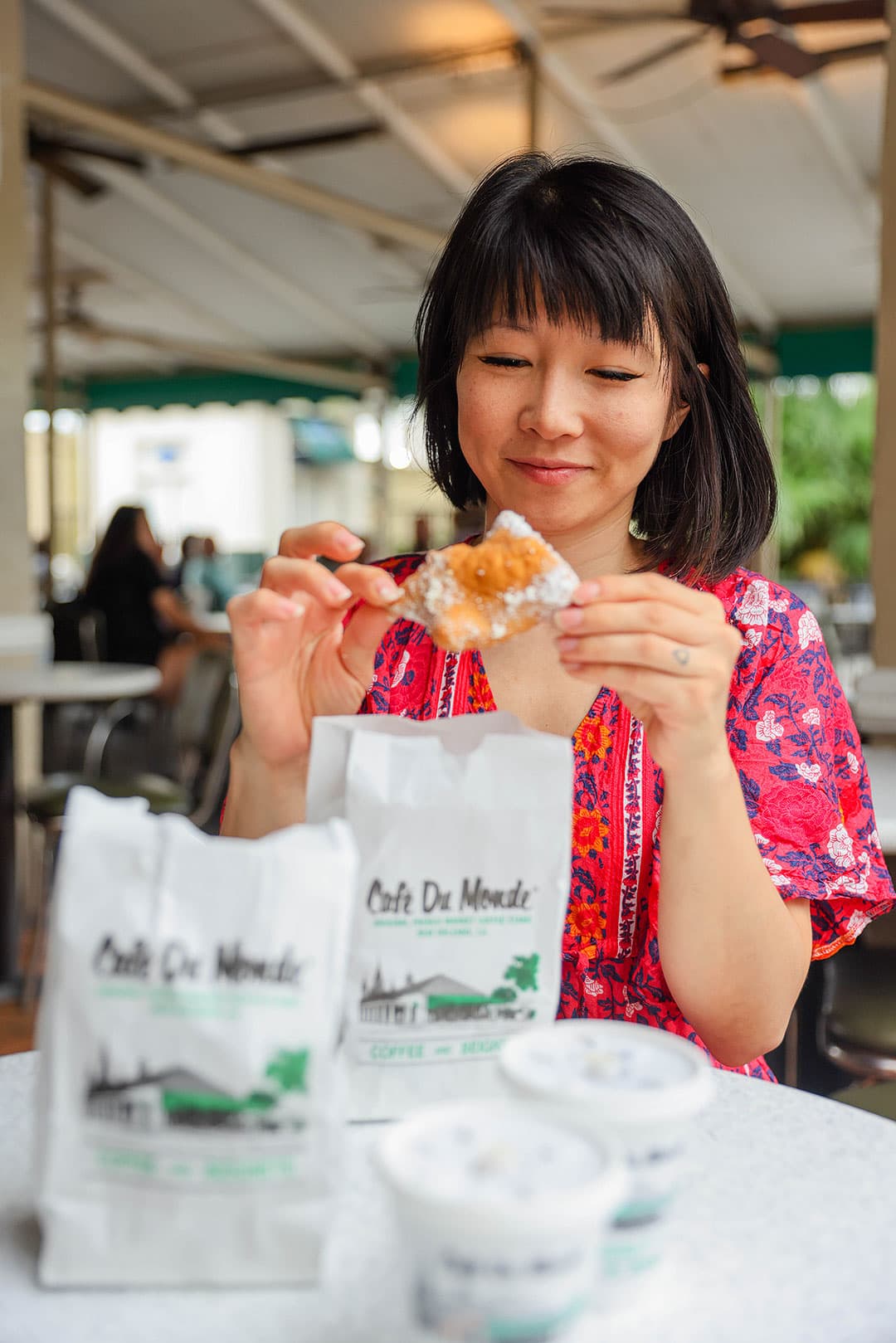
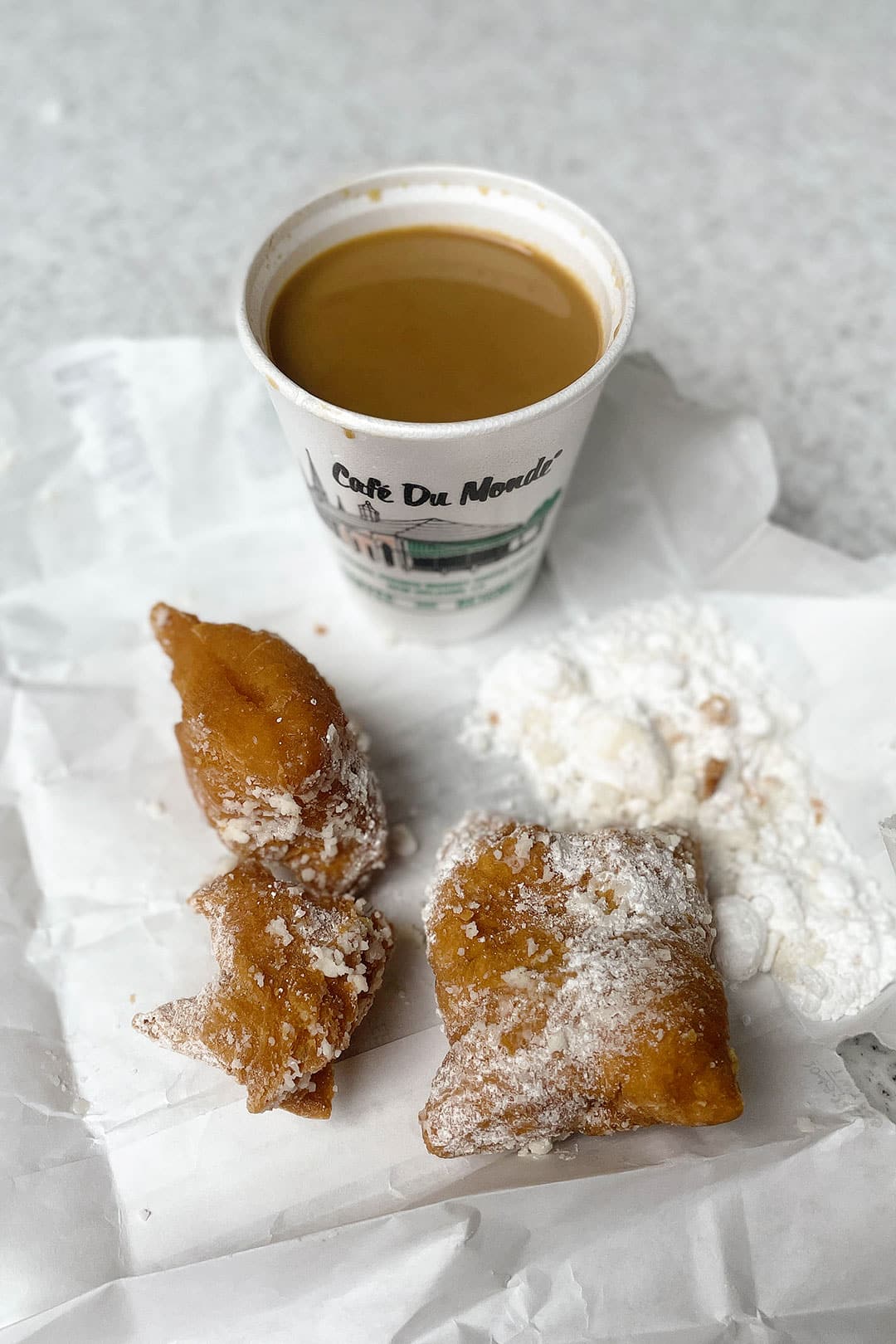
4. French Market – Shops of the COlonnade
1008 N Peters St, New Orleans, LA 70116, map
Cafe du Monde is part of the French Market District, but if you venture a little north, you’ll find more boutiques, cafes, restaurants, bars, gift shops, craft makers, and even a farmers and flea market. We would have loved to grab a bite here if it weren’t for our planned meals.
Local Tip: Most spots in the French Market close by 5 pm, so keep that in mind when you plan your day.
See More: 25 Best Markets in the World to Put on Your Bucket List
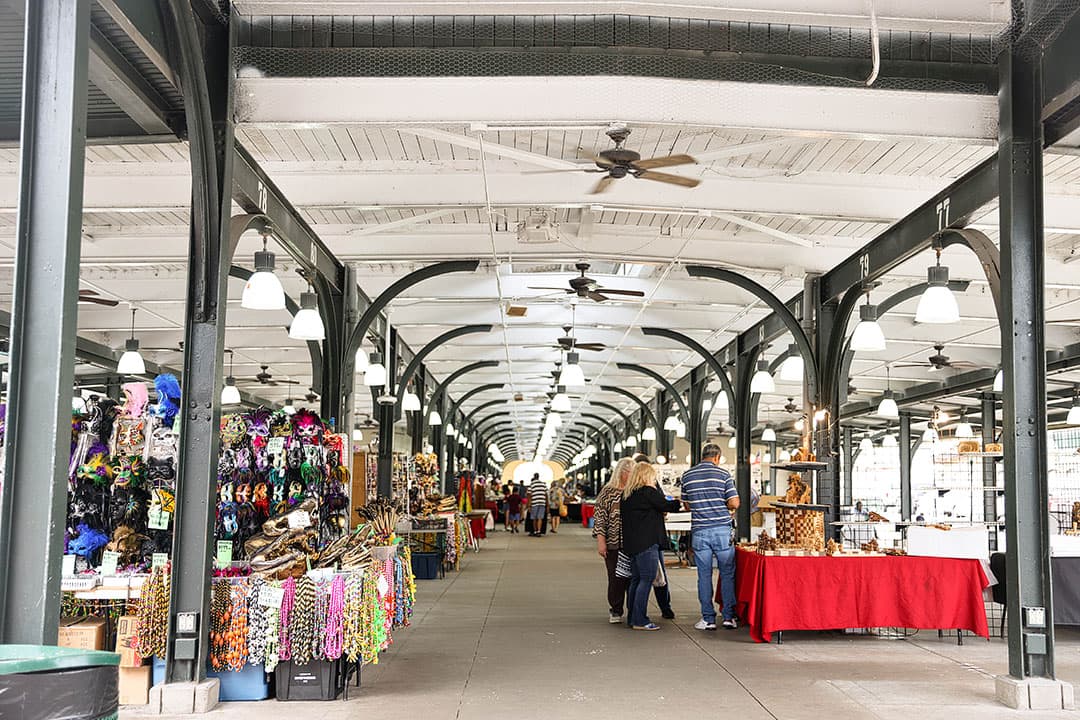
5. Jackson Square
701 Decatur St, New Orleans, LA 70116, map
Jackson Square is a National Historic Landmark and one of the most recognizable spots in the city. It’s also known as Place d’Armes and covers 2.5 acres. It beautifully frames the St. Louis Cathedral, and you will find artists lining the exterior.
Local Tip: Head across Decatur St to Washington Artillery Park for a higher vantage point.
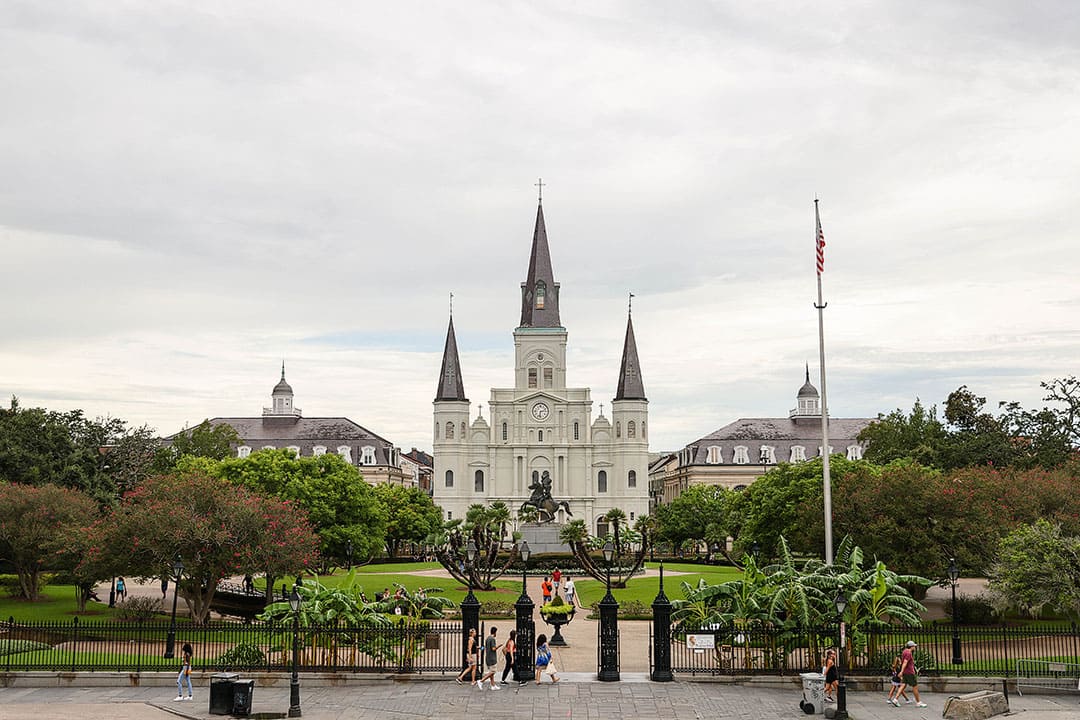
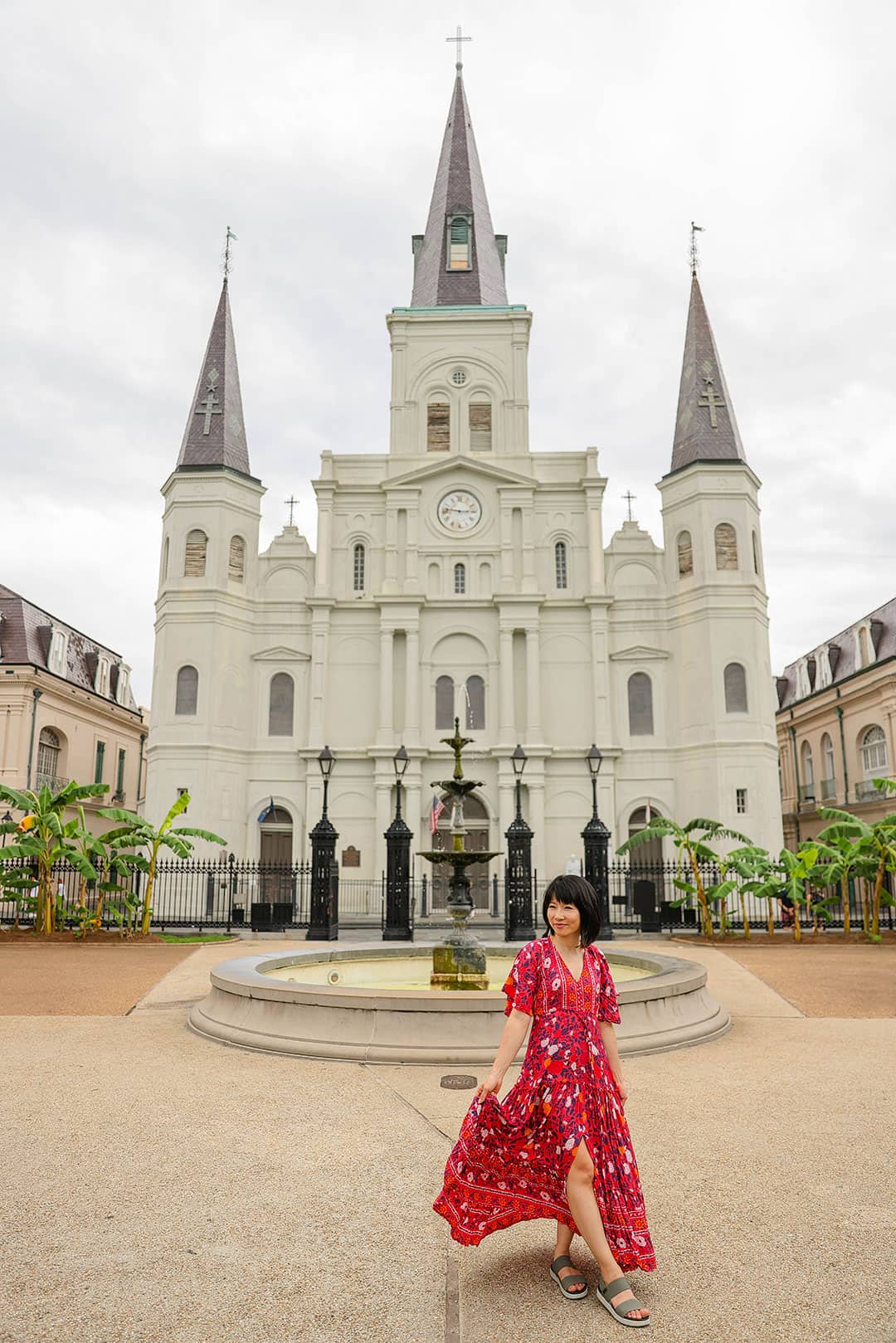
6. Faulkner Books
624 Pirate’s Alley, New Orleans, LA 70116, map
Tucked away in the alleyway west of St. Louis Cathedral is a very unassuming book shop. One of our drivers called this alleyway “The Harry Potter street”. You can find Faulkner House Books housed inside William Faulkner’s former home. He only stayed here for six months, but rumors are that his ghost still hangs around the female staff. The current owners, who live in the remainder of the house, turned the space into a beautiful bookstore that houses fine literature and rare editions. If you’re looking for recommendations, ask the knowledgeable staff.
Local Tip: They currently only allow four people in at a time since it’s a small space. Sometimes you have to wait outside for a while. You also need to call ahead to see any of the rare books.
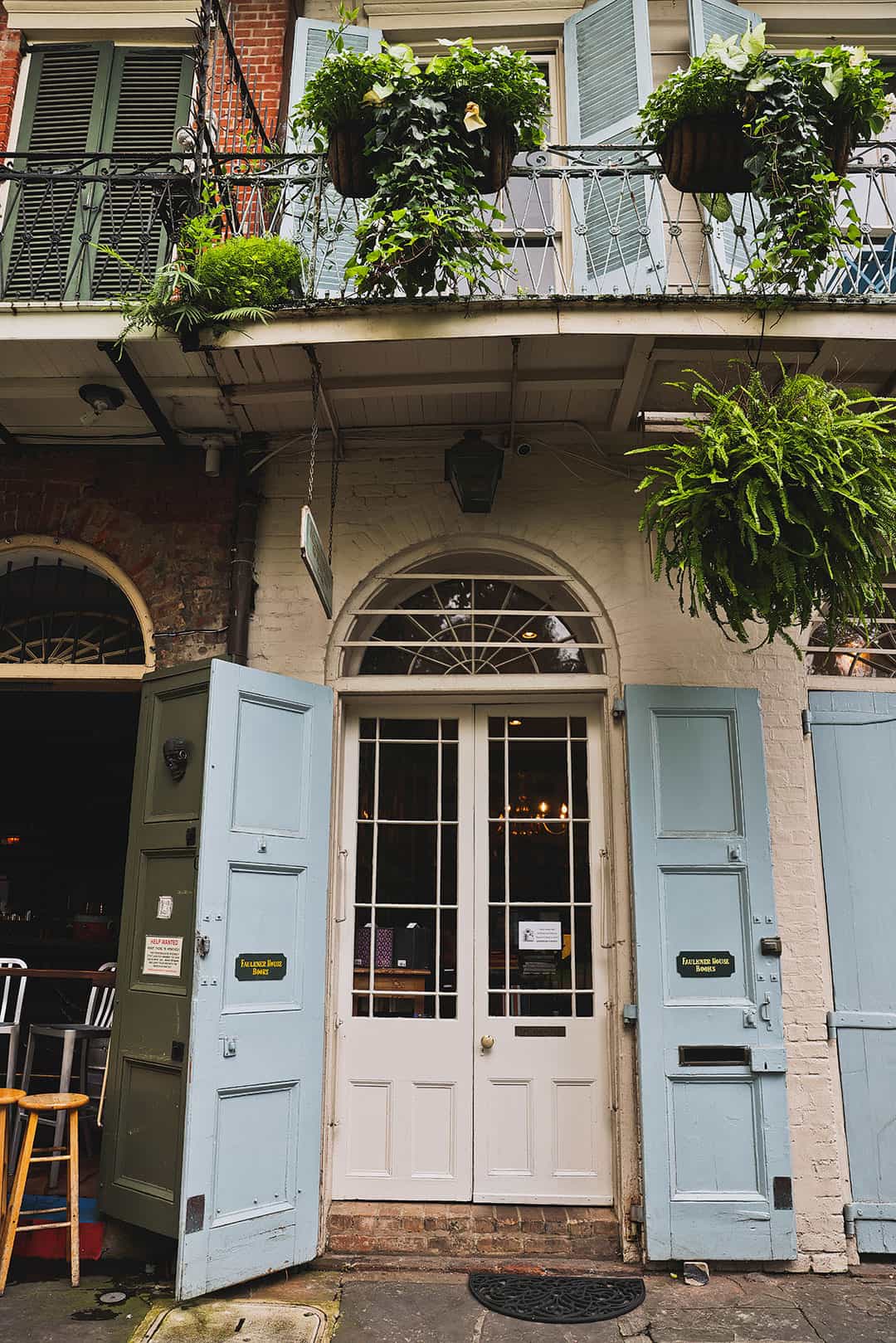
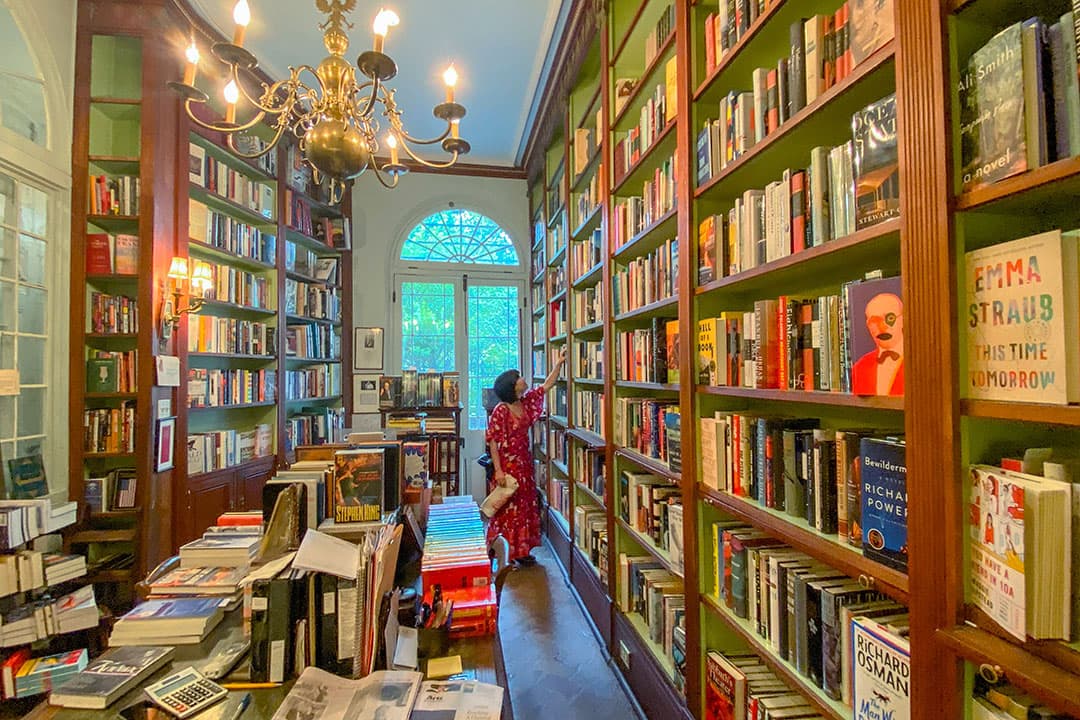
7. Labranche House and the Architecture of the French Quarter
700 Royal St, New Orleans, LA 70116, map
You can find beautiful homes and architecture throughout the French Quarter, but LaBranche House is the most photographed. When we got closer to it, it was easy to spot because groups of people were taking photos in front of it (both the upside and downside to Instagrammable places).
Local Tip: Remember that these are active streets. Make sure you’re out of traffic’s way.
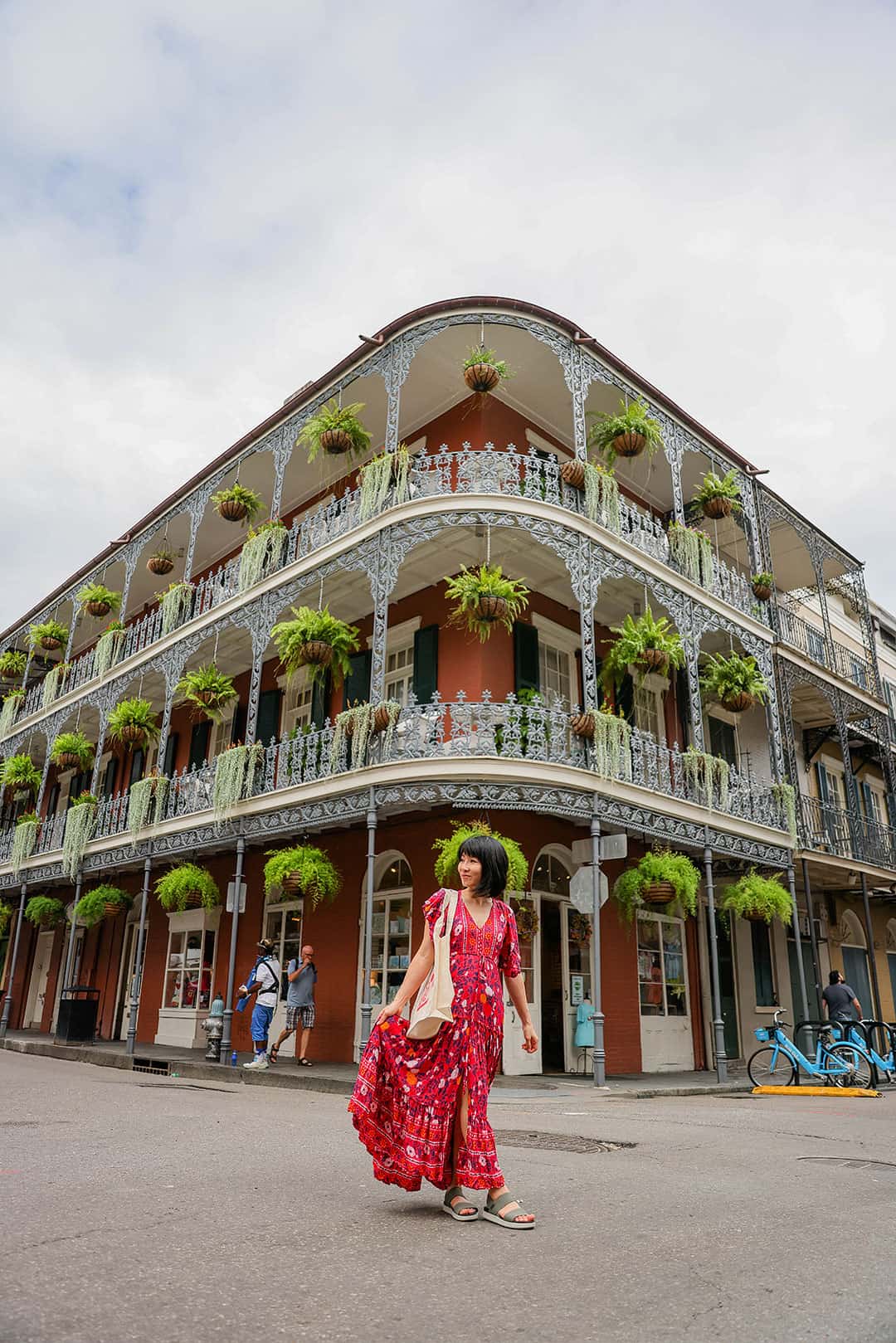
8. Bourbon Street + Lafitte’s Blacksmith Shop Bar
941 Bourbon St, New Orleans, LA 70116, map
Whether or not you’re here to party, you should at least walk down the iconic Bourbon Street. If you’re looking for a unique place to grab a drink, check out Lafitte’s Blacksmith Shop Bar, which is claimed to be the oldest bar in the US. It was built between 1722 and 1732 and is filled wall to wall with history. According to legend, Jean Lafitte had a business here in the early 19th century.
Local Tip: It’s not just a historic bar but popular for its nightlife. Don’t miss the piano bar!
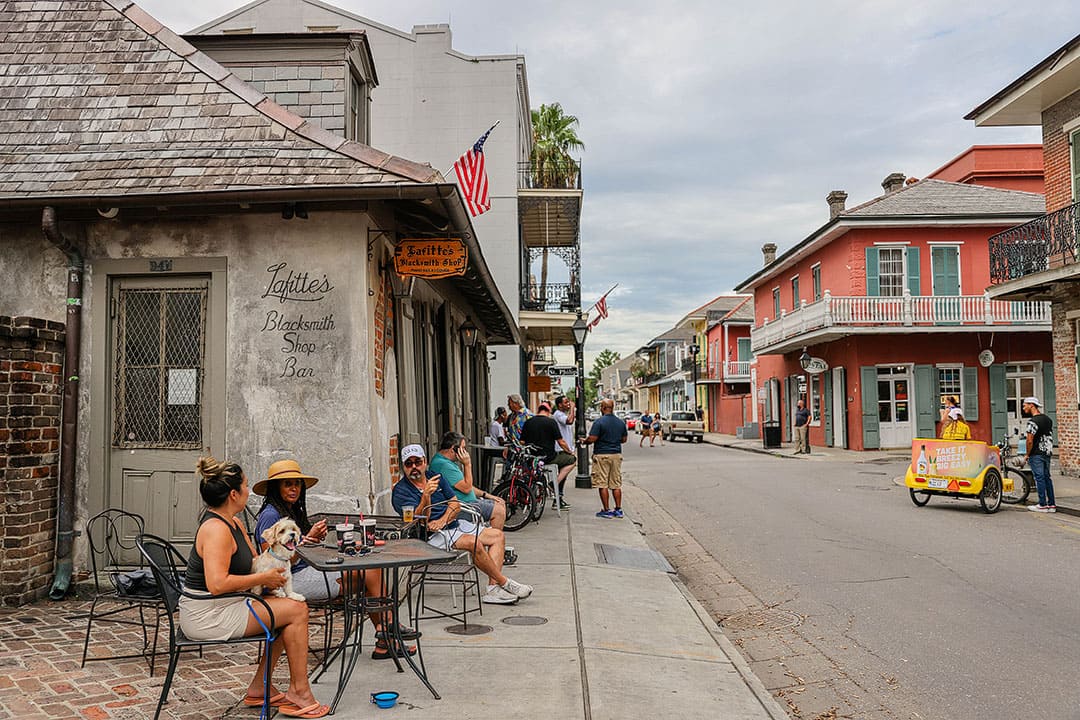
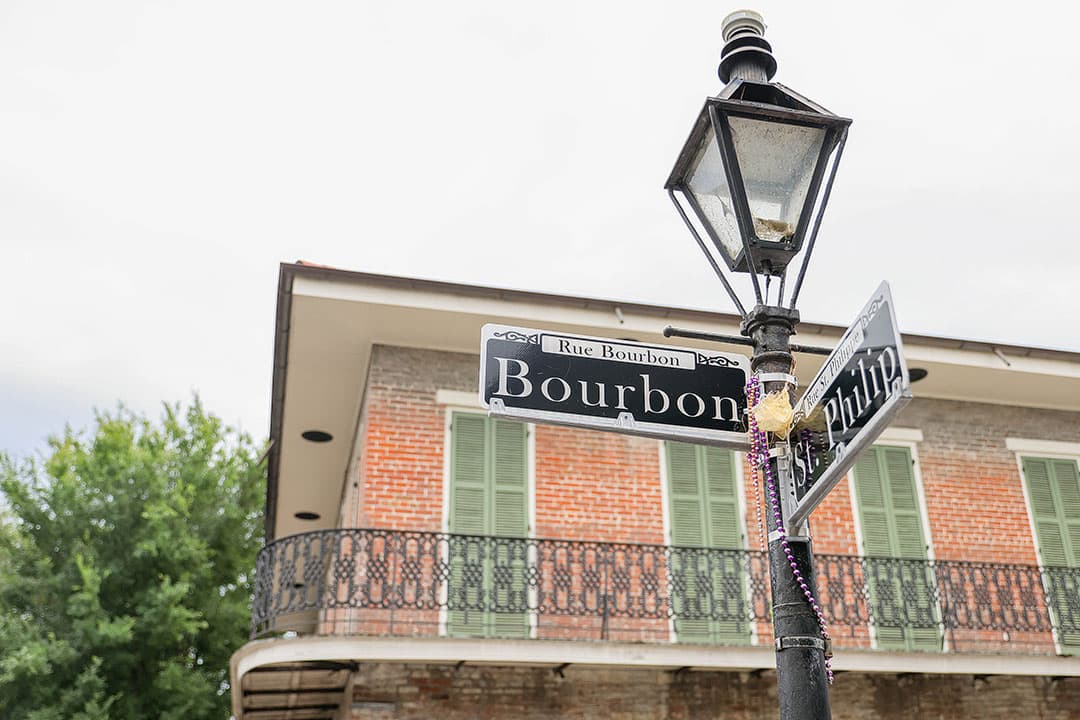
9. Music on Frenchmen Street
532 Frenchmen St, New Orleans, LA 70116, map
You can’t leave New Orleans without experiencing some live music. Tourists will flock to Bourbon Street, but IYKYK and Frenchmen Street is where it’s at. The neon blue lights drew us into the Blue Nile, where we watched New Breed Brass Band perform. We kept playing their single on repeat when we got back. They were so good!
Other venues to check out are the Spotted Cat Music Club and D.B.A.
Local Tip: Don’t forget to bring some cash to tip the bands!
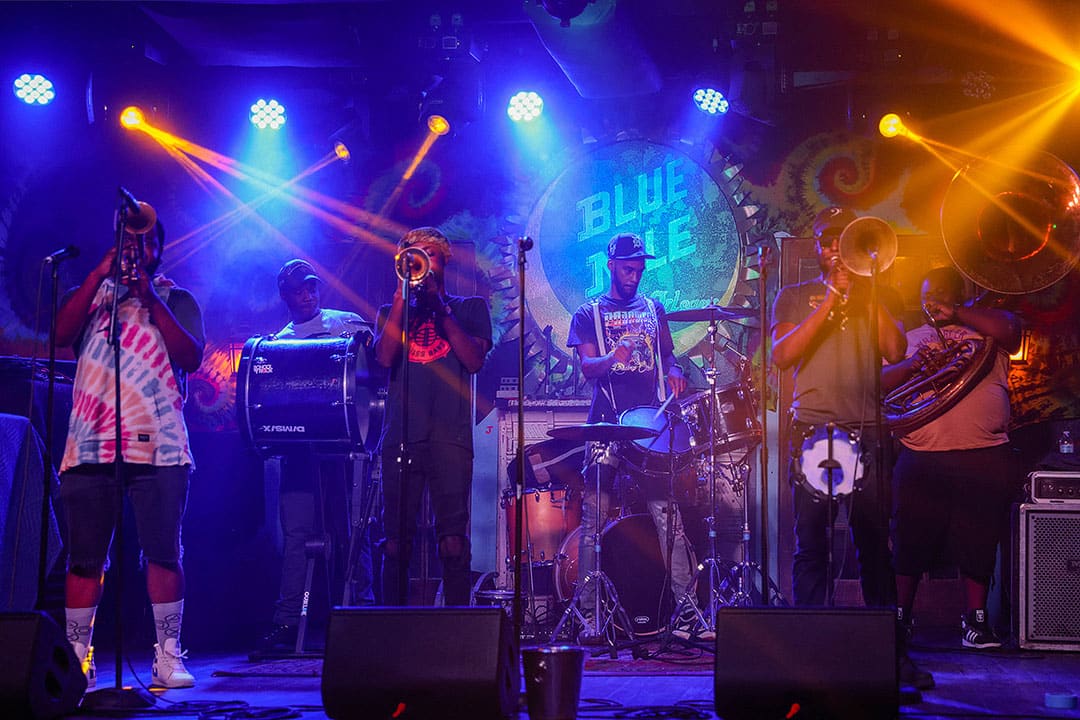
Bonus: The Escape Game New Orleans →
233 N Peters St, New Orleans, LA 70130, map
We love Escape Rooms and The Escape Game is by far our favorite ones we’ve been to. We didn’t have time to check out the New Orleans one while we were there, but they have the same rooms in Las Vegas and they are so much fun. If you’re looking for a way to escape the heat and get the brain working, book an outing at The Escape Game.
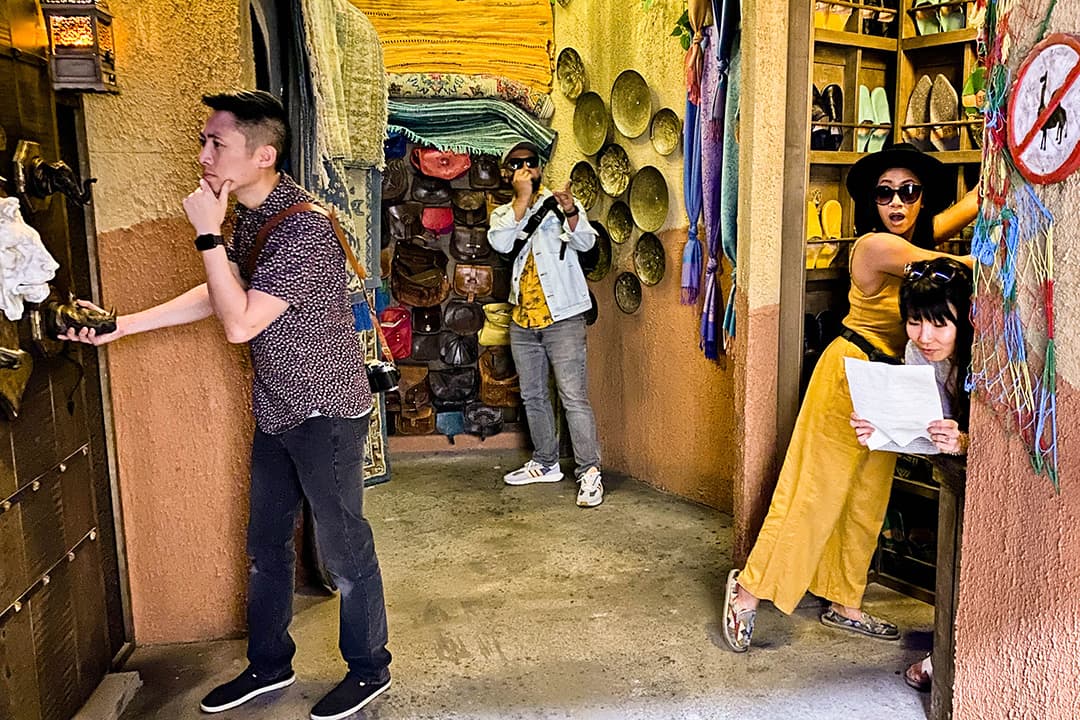

Day 2: Get Outside
During your weekend in New Orleans, you need to see the bayou, another big part of New Orleans. It’s a great way to get out in nature with the opportunity to learn more about the area.
10. Swamp Kayak Tour (with Gators)
1407 Piety St, New Orleans, LA 70117, map
We’ve kayaked in a lot of places, but this was such a unique environment. The Mississippi River Delta is a stunning place that is disappearing because of rising sea levels and eroding coastlines. A great way to learn more about the fragile ecosystem is an eco-kayak tour. We did a tour with New Orleans Kayak Swamp Tours and had an amazing guide who knew the area.
He taught us a lot about the ecosystem at various stops. We saw a handful of gators in the water, primarily adolescent ones that weren’t as intimidating. They all swam away if we were nearby. Also, since the water is slow-moving, you paddle at a leisurely pace.
A few Tips:
- Book a morning or late afternoon trip for cooler weather and a better chance to see wildlife.
- Wear something you don’t mind getting dirty in. I wore a bathing suit. Jacob had a lighter color shirt on, and you could see all the swamp water that splashed on it.
- Bring plenty of sunblock, and don’t forget to reapply (that’s usually why we get sunburnt).
- If you are going with a larger group, we recommend going on tandem kayaks. Some areas of the swamp get narrow, and it makes for a better experience when there are fewer boats in your group.
- Surprisingly, we didn’t see mosquitoes on our swam tour. They were everywhere in the urban parks (this was early August but may depend on the season). They did, however, have these gigantic grasshoppers (they must have been 3 inches long) if you aren’t a fan of bugs.
- You can leave anything you don’t need in the van. We brought a dry sack for any items we brought with us on the kayak.
- Bring cash or ask for the guide’s Venmo to tip them if you had a great time.
Local Tip: If you don’t have a car, you can arrange transportation to and from the location for an extra fee.
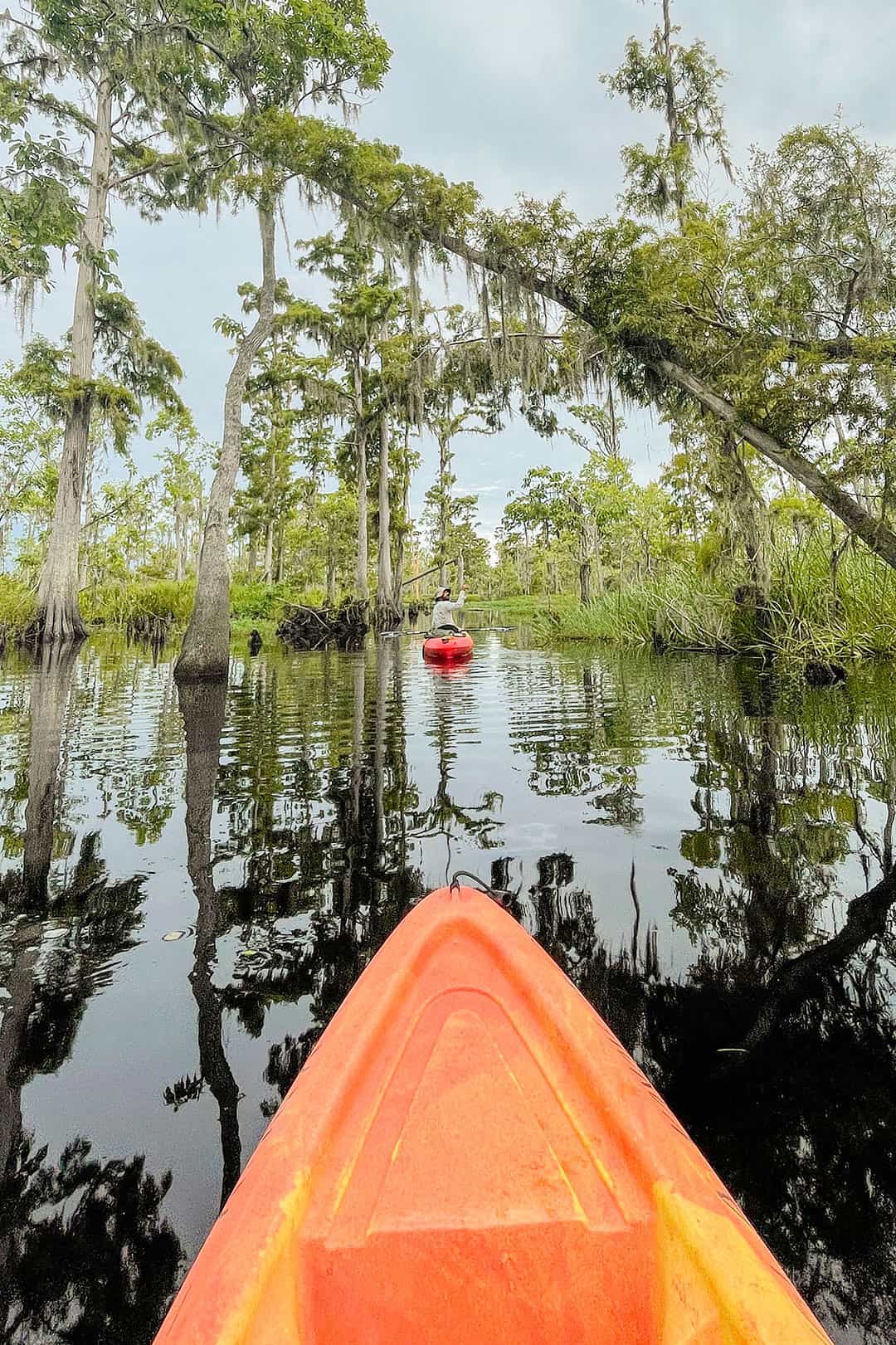
11. Zip Nola
301 Peavine Rd, Laplace, LA 70068, map
Zip Nola is the first zipline we’ve done over a swamp where you can spot wildlife like gators below you. When we arrived, we checked in and hung out on their deck, which had games to play while we waited. You can also view the baby gator they have inside or the adult gators hanging out in the swamp below the deck (they keep them here because they either can’t survive in the wild by themselves or were a nuisance to the public and would be killed otherwise).
After getting geared up, you have to climb a giant spiral staircase to the first platform, which is the scariest part of the experience. Everything is secure, but it’s not easy if you’re afraid of heights. We had one guy in our group back out mid-way up the stairs. There are five ziplines and a couple of bridges/walkways you’ll encounter on the course. The guides also teach you tricks if you’re daring enough.
A few Tips:
- They have lockers where you can put anything you don’t need. Don’t bring anything loose with you!
- Bring plenty of sunblock.
- Wear closed-toed shoes and shorts or pants. I wore a dress with shorts under them and sandals with a secured back, which was fine.
- They have clean, flushable bathrooms.
- Bring cash or ask for the guide’s Venmo to tip them if you had a great time.
Local Tip: This is another spot that offers transportation from the city. If you do both on the same day, see if you can coordinate one to drop you off at the other spot since they are so close.
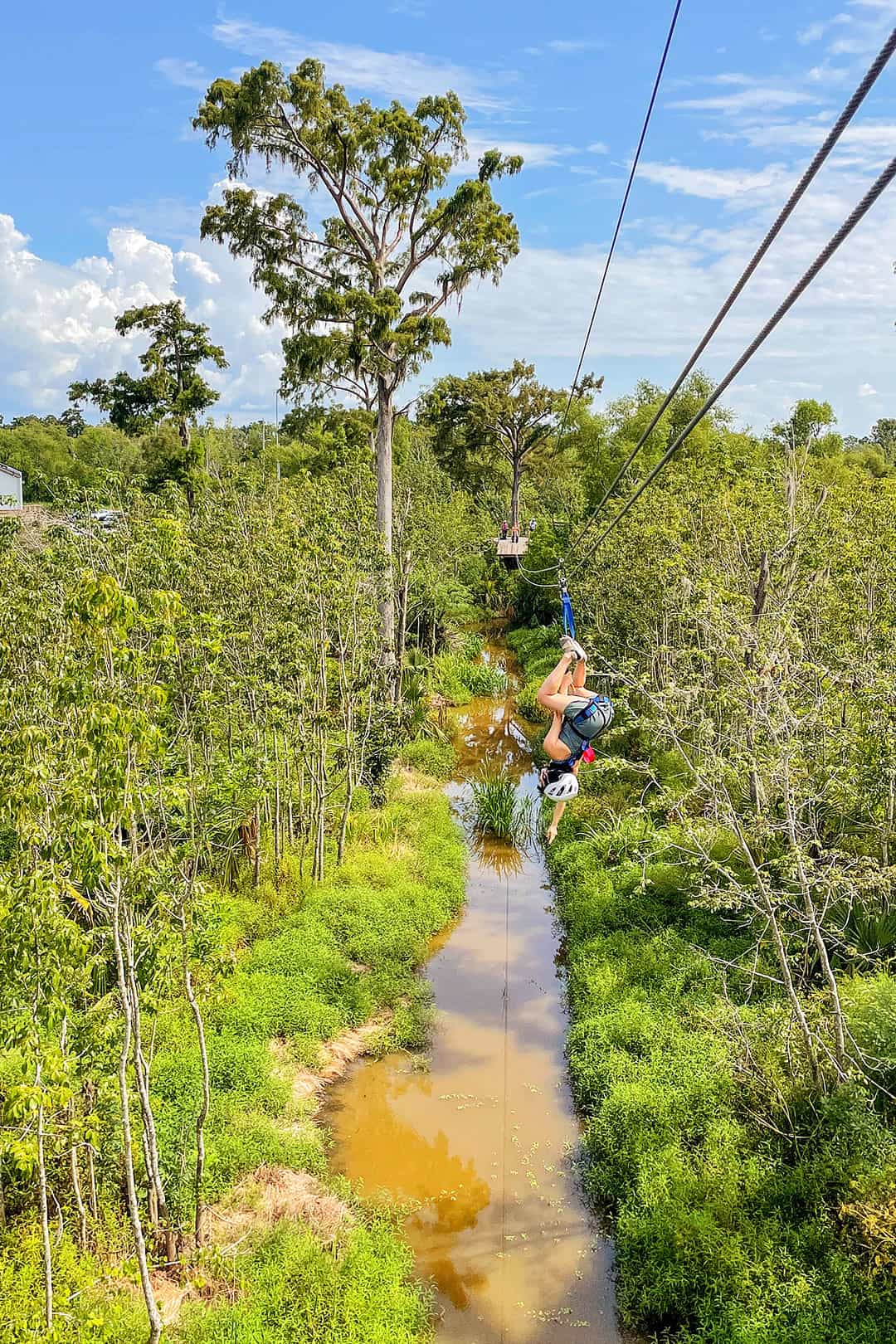
12. Streetcar Ride
The streetcars that run through the city are picturesque but also a great way to get around town if you don’t have a car. There are five lines that all start downtown and will take you to some of the most iconic spots around town. Rides are $1.25 that must be paid with exact change, or if you plan on riding them multiple times a day, pick a Jazzy Passes for one ($3), three ($9), and 31-day ($55) unlimited rides. Here is a list of places you can get the pass.
Streetcar Lines
The Saint Charles Streetcar runs down the middle of St. Charles and Carrollton avenues and has been around for over 150 years. It’s the oldest continuously operating streetcar line in the world. Along the route, you’ll see Antebellum mansions, Loyola and Tulane universities, and Audubon Park.
The red Canal Street Line is popular with locals and tourists since it runs from the base of Canal Street to Mid-City. It ends at City Park Avenue at the historic cemeteries. Some cars will take you to the New Orleans Museum of Art located in City Park.
The Riverfront Line takes you from the Aquarium of the Americas to the French Market and more. You can also reach Harrah’s Casino, the shops at Canal Place, and the Outlet Collection at the Riverwalk.
The Loyola/UPT Line was introduced in 2013. It allows anyone arriving in the city via Amtrak or Greyhound an easy way to get to the city and hotels. It also takes you through the Warehouse Arts District, Financial District, and Medical District.
The Rampart/Saint Claude Streetcar Line was reinstated in 2016 (the last time the city used it was in 1949), and it takes you to St. Louis Cemetery No. 1, where you can find the tomb of Voodoo Queen Marie Laveau. It also takes you to Louis Armstrong Park, the St. Claude Arts District, and the Marigny/Bywater neighborhood.
Local Tip: If you like to plan every detail, you can use their online scheduler to see where the streetcars are.
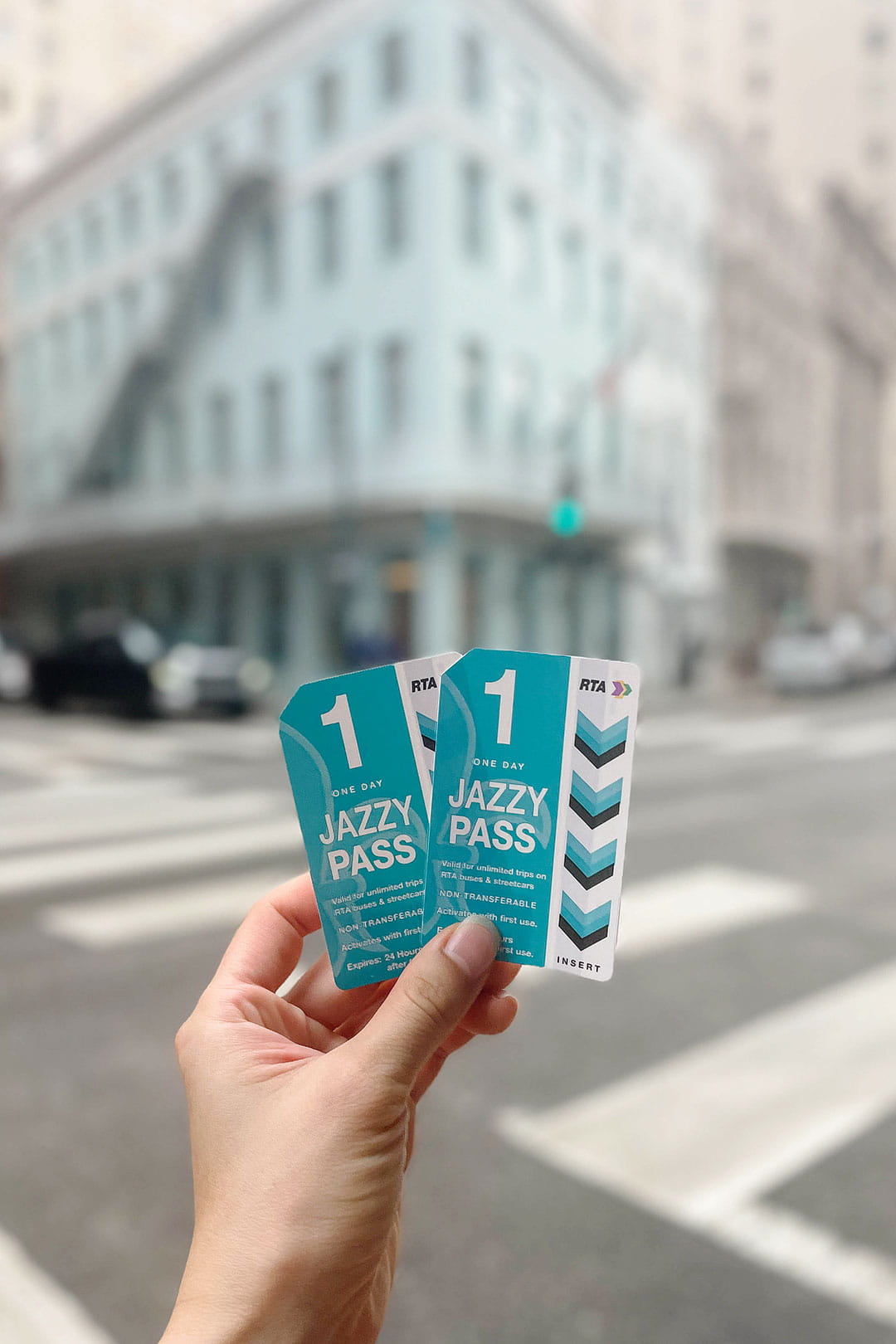
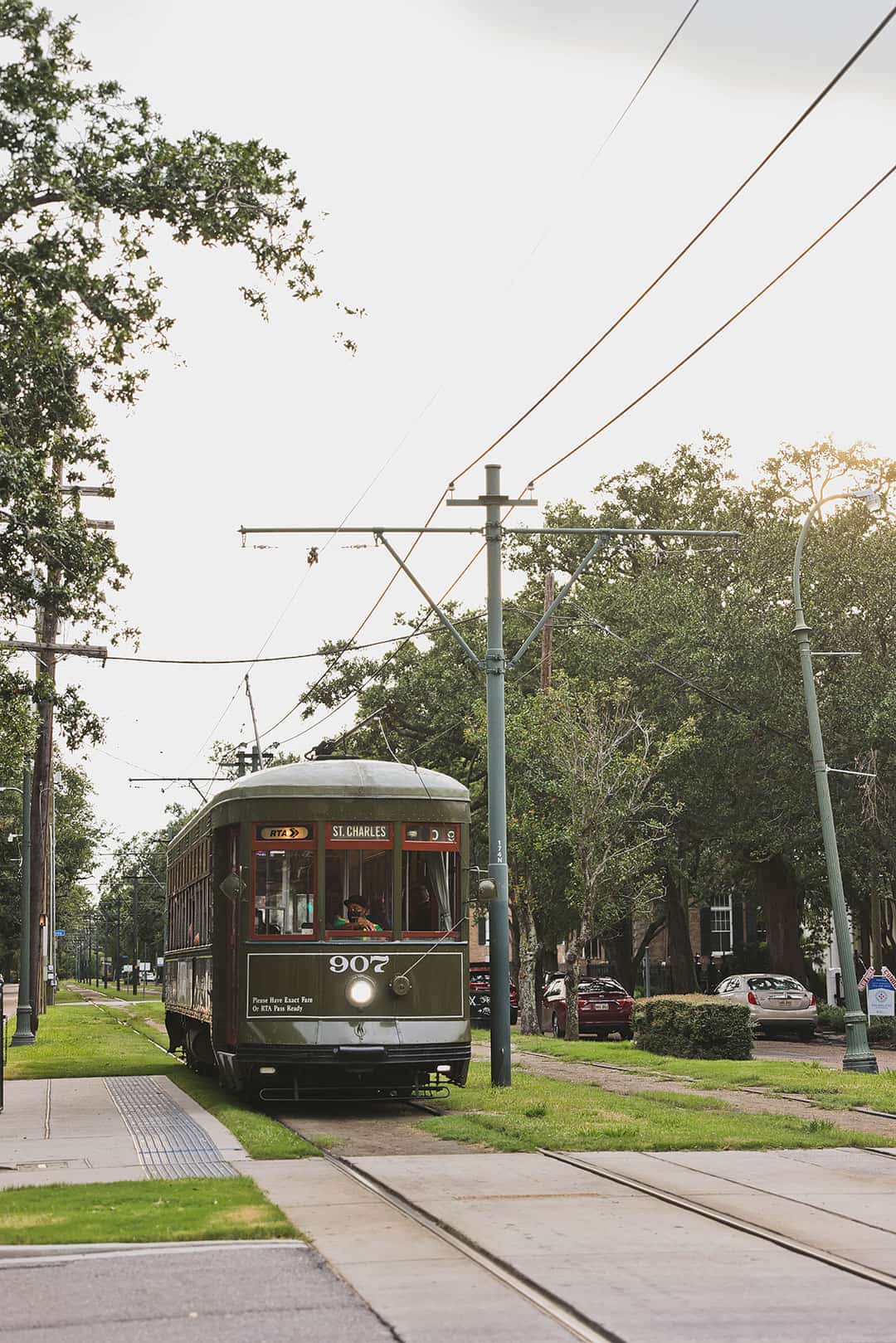
13. City Park
1 Palm Dr, New Orleans, LA 70124, map
New Orleans City Park covers 1,300 acres making it one of the largest urban parks in the United States (Central Park is only 840 acres). We only spent a couple of hours there, but you can easily spend a full day here. Within the park, you’ll find the New Orleans Botanical Garden, Couturie Forest and Arboretum, the Louisiana Children’s Museum, the New Orleans Museum of Art, and the largest grove of mature live oaks in the world.
We spent our whole time in the southern part of the park exploring the groves and McDonough Oak (the oldest tree in City Park at roughly 800 years old), the Langles bridge, and walking around the free sculpture garden outside of the New Orleans Museum of Art.
Local Tip: There is a Cafe du Monde location here where you can see them making it through a glass pane and where you can find air-conditioned, indoor seating.
Alternative: If you’d rather explore Uptown, Audubon Park is also very beautiful with massive oak trees. It looks similar to City Park minus the museums and with more college students.
See More: 25 Free Things to Do in New Orleans
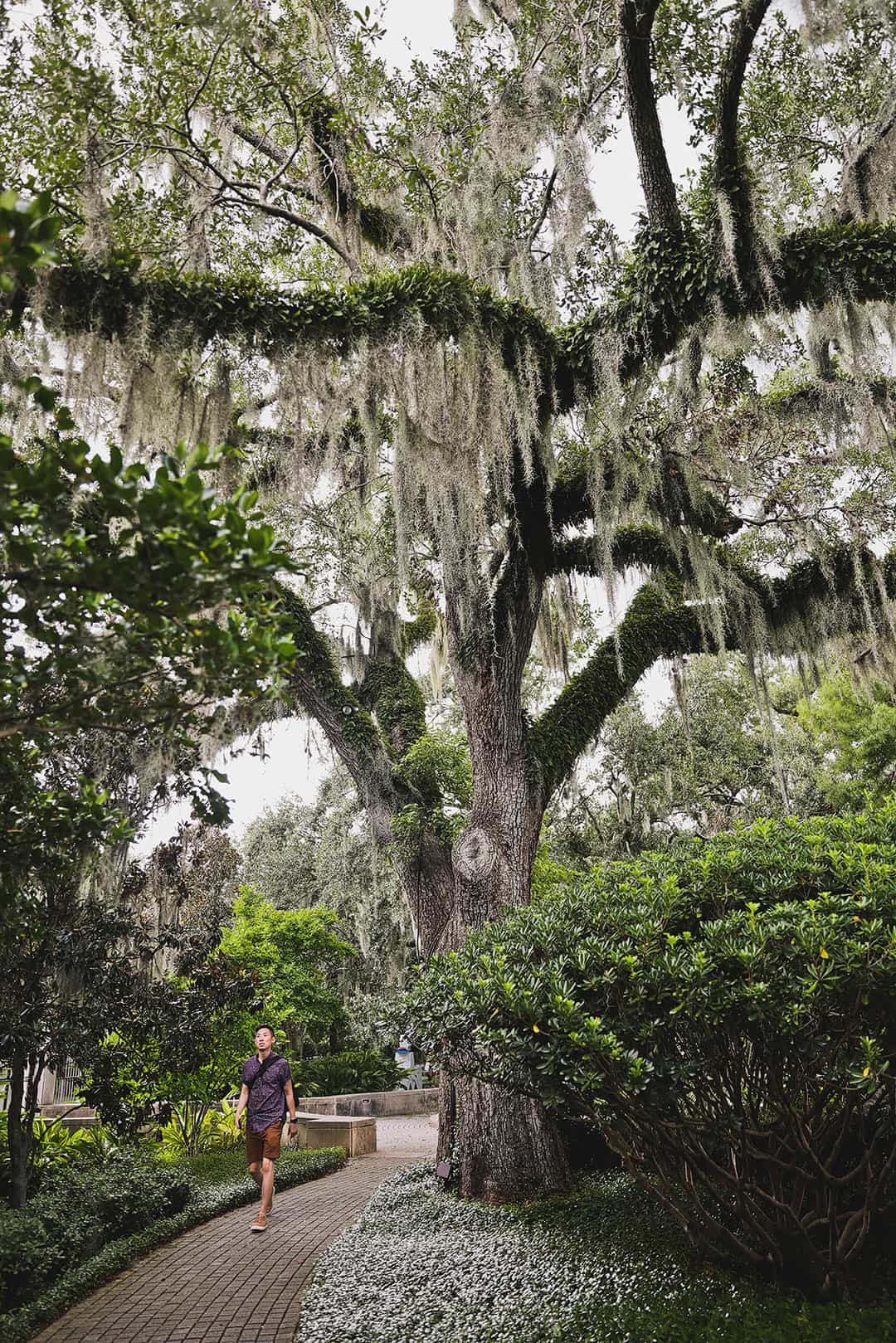
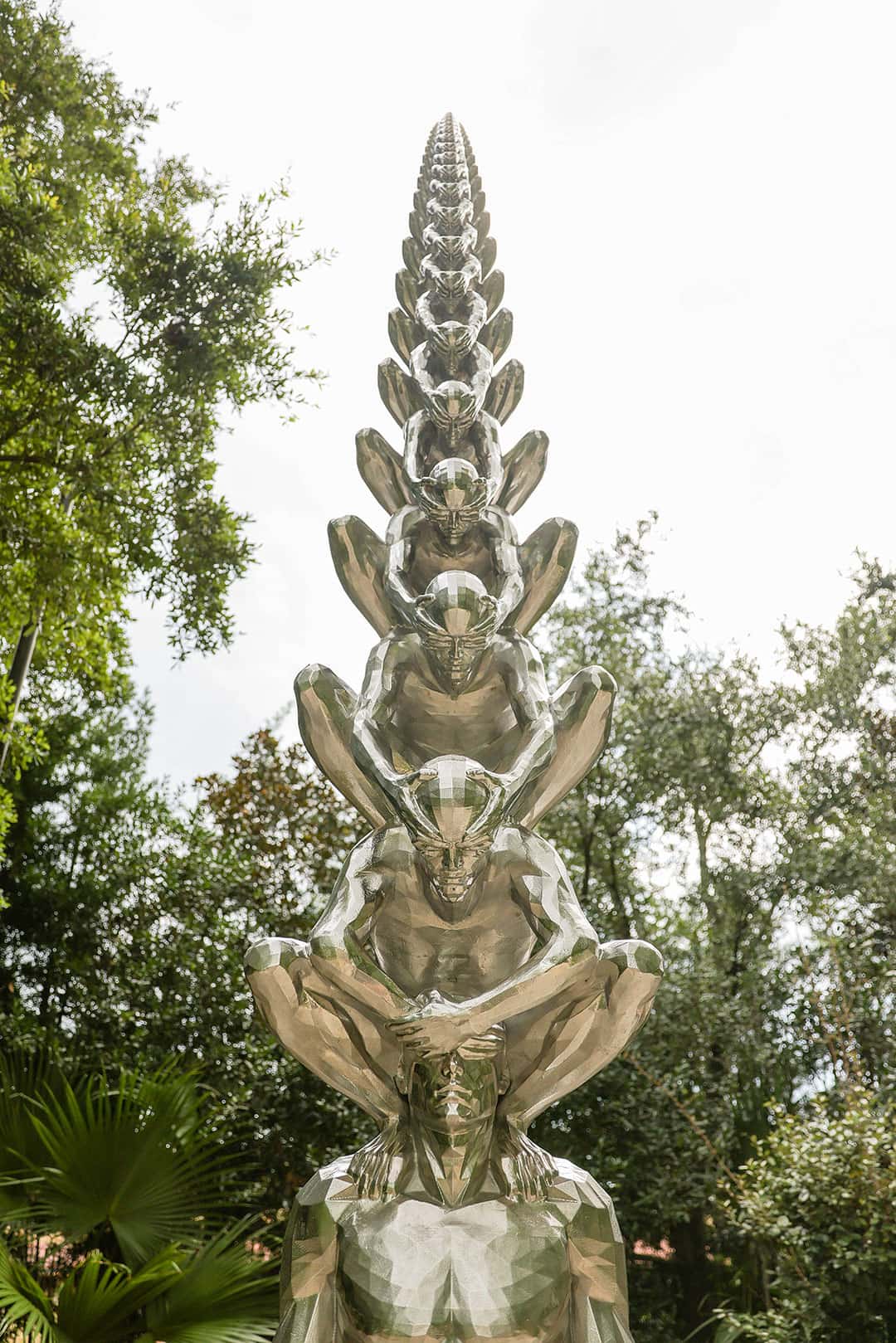
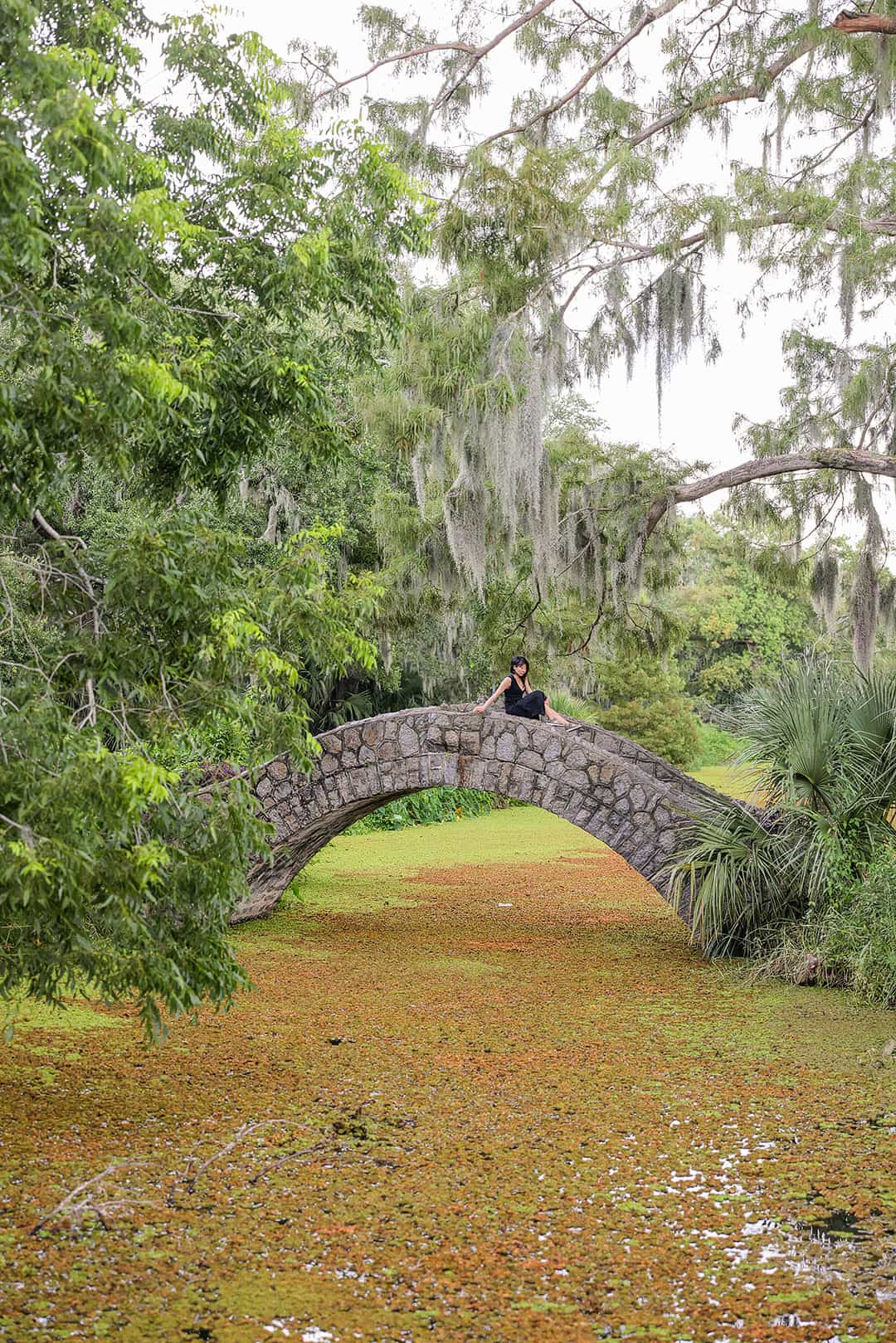
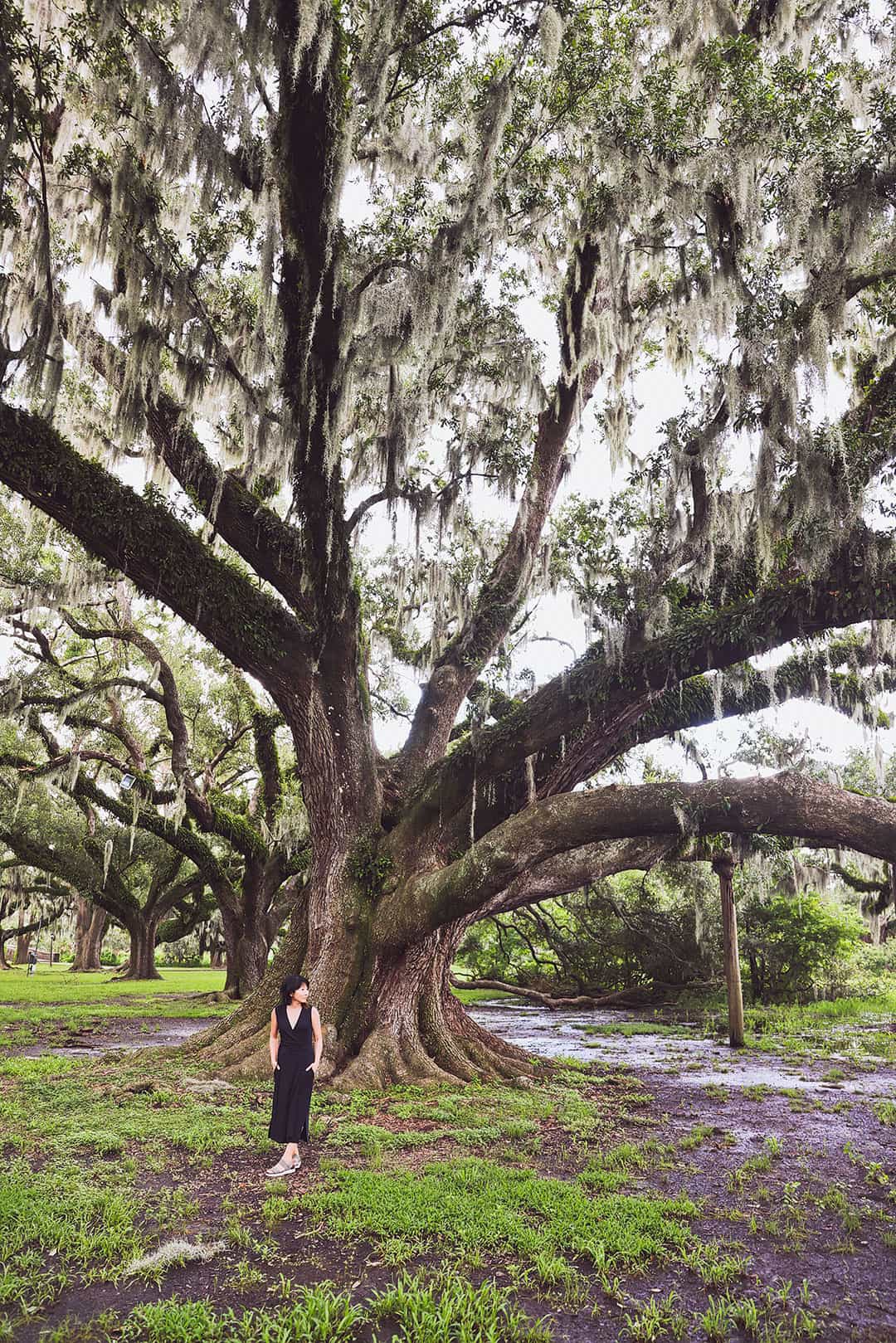
14. Peacock Room
501 Tchoupitoulas St, New Orleans, LA 70130, map
The Peacock Room is great to wind down after a long day of exploring. It’s a popular spot for live music, food, and cocktails. It’s also very photogenic, and our server mentioned it’s popular among IGers. Since we were already conveniently staying at the Kimpton Hotel Fontenot, we got to pop in one evening for dinner to enjoy the music of Robin Barnes and Pat Casey.
Local Tip: They do not have music every day, but check their calendar to see the latest lineup. They also have Flash Your Feathers Friday, where you get a complimentary glass of bubbles if you wear your flashiest headpiece (4 pm to midnight).
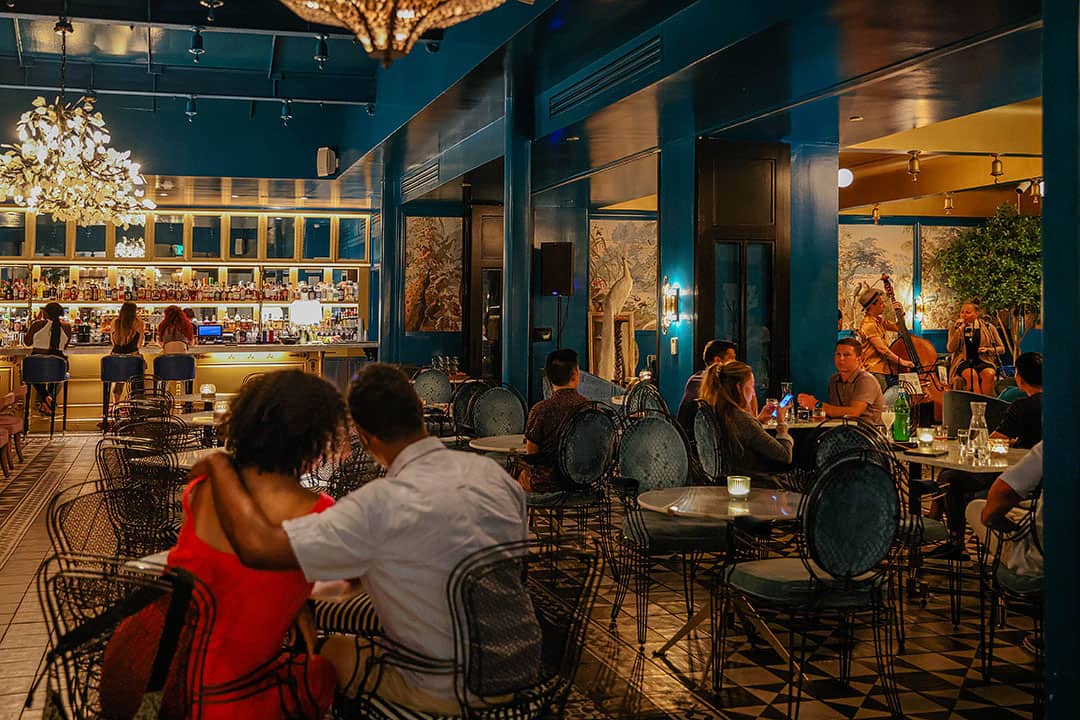
Day 3: CBD and Bywater Neighborhoods
Whether you have an extra full or half day for your weekend in New Orleans, or just want to replace one of the other activities based on your interests, here are the places we suggest for day three. We loved exploring the Bywater neighborhood as well as the CBD (Central Business District).
15. Vue Orleans
2 Canal St, New Orleans, LA 70130, map
Vue Orleans is a 360° observation deck right on the Mississippi River. Before heading up to the indoor and outdoor observation decks, there are several interactive exhibits where you get a chance to learn more about New Orleans. The indoor observation deck has digital “viewfinders” that can swivel around, and you can interact with what you see in the distance.
You can see everything in roughly 1.5 hours (get timed tickets here).
Local Tip: If you feel peckish during your visit, there’s a cafe on the top floor.
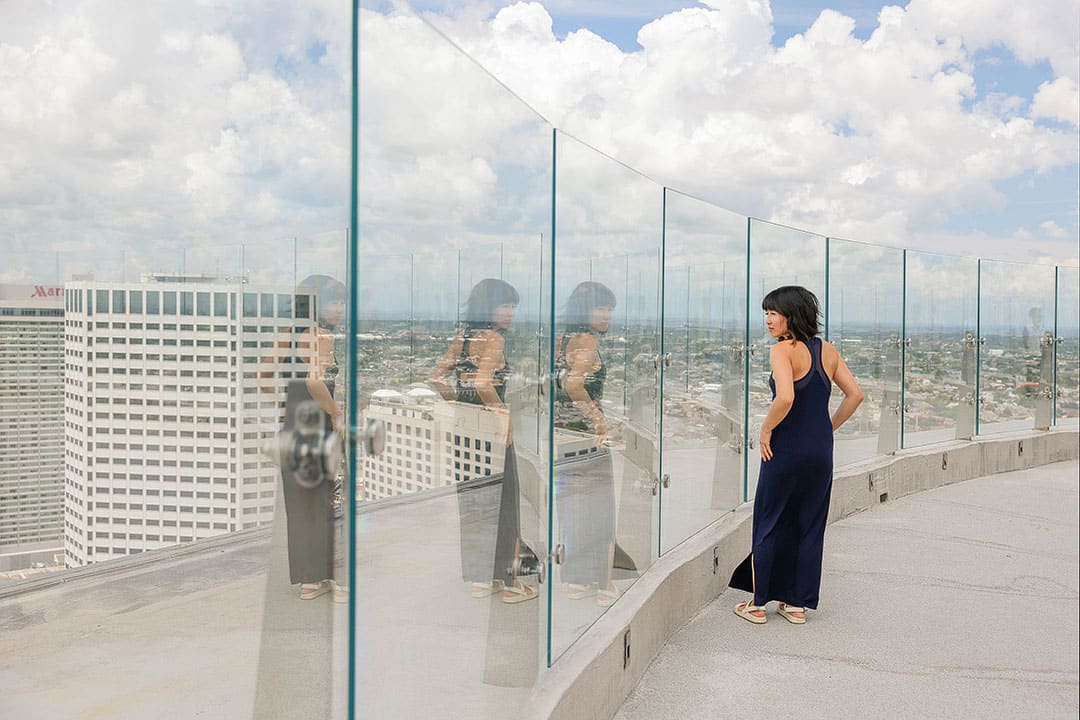
16. The Sazerac House
101 Magazine St, New Orleans, LA 70130, map
The Sazerac House is another excellent stop if it’s hot outside or if you’re into cocktails. Their complimentary self-guided tour takes roughly 1.5 hours and includes three tastings. The space is beautiful and covers three floors. The Sazerac cocktail has been famous since the 1850s, and the tour takes you on a journey through its customs, traditions, and culture.
If you want to enhance your visit, they also have additional tastings and tours you can purchase.
Local Tip: It gets busy, and they recommend you make reservations online.
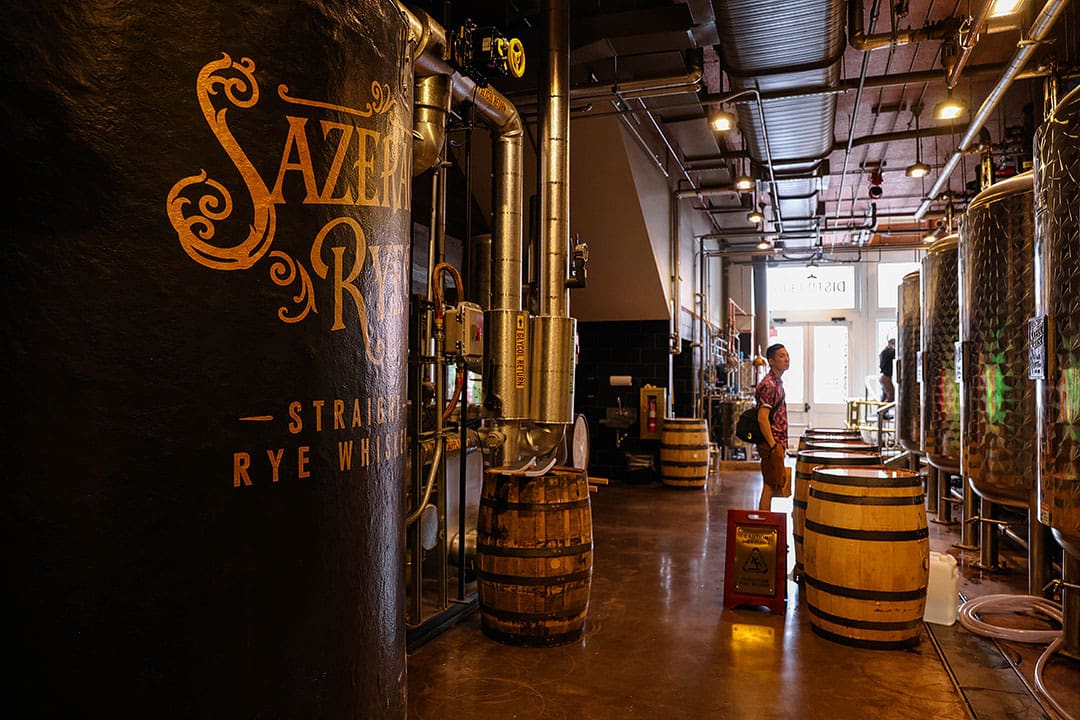
17. Bywater Neighborhood + Crescent Park
2300 N Peters St, New Orleans, LA 70117, map
The Bywater neighborhood is known for its art scene, colorful homes, and quaint eateries. We had fun wandering around, but if you want specific points of interest, here are a few notable spots to check out:
- Crescent Park has great views of the Mississippi River and reminds us a lot of the Highline in NY or the Beltline in Atlanta. It’s a great spot for a picnic while watching ships go by. Plus, there is a unique Rusty Rainbow Bridge that takes you over to the park.
- Euclid Records was my favorite stop, where you can browse their extensive collection of vinyl.
- Studio Be was founded by a local artist known as Bmike. The 35,000-square-foot warehouse houses huge murals, art depicting revolutionaries, and homages to Civil Rights legends.
- Dr. Bob Folk Art was unfortunately closed during our visit because he was sick, but seeing the eclectic art on the outside makes us want to visit next time we’re in town.
Local Tip: This was by far the quietest neighborhood during our visit, but we were also visiting off-season.
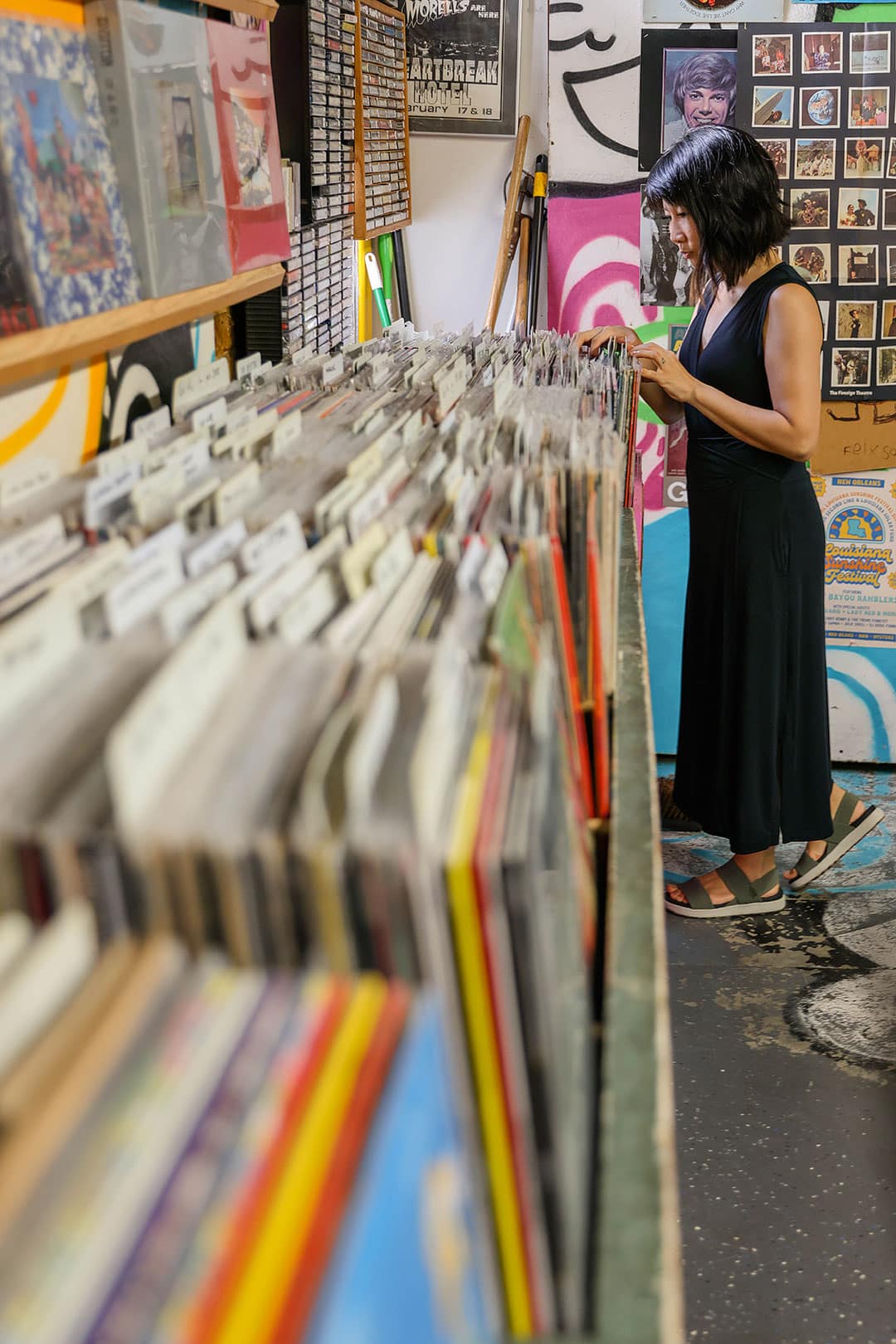
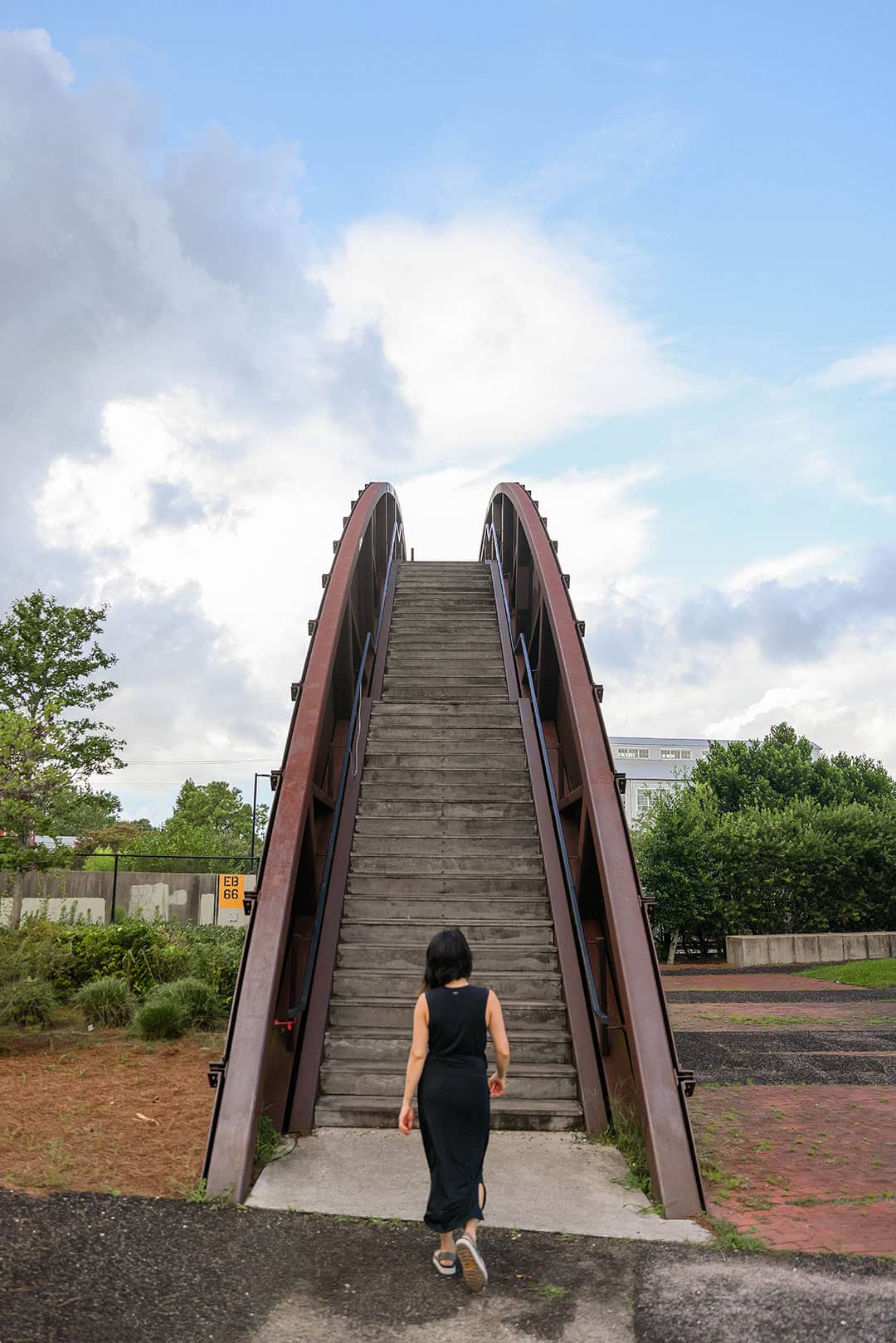
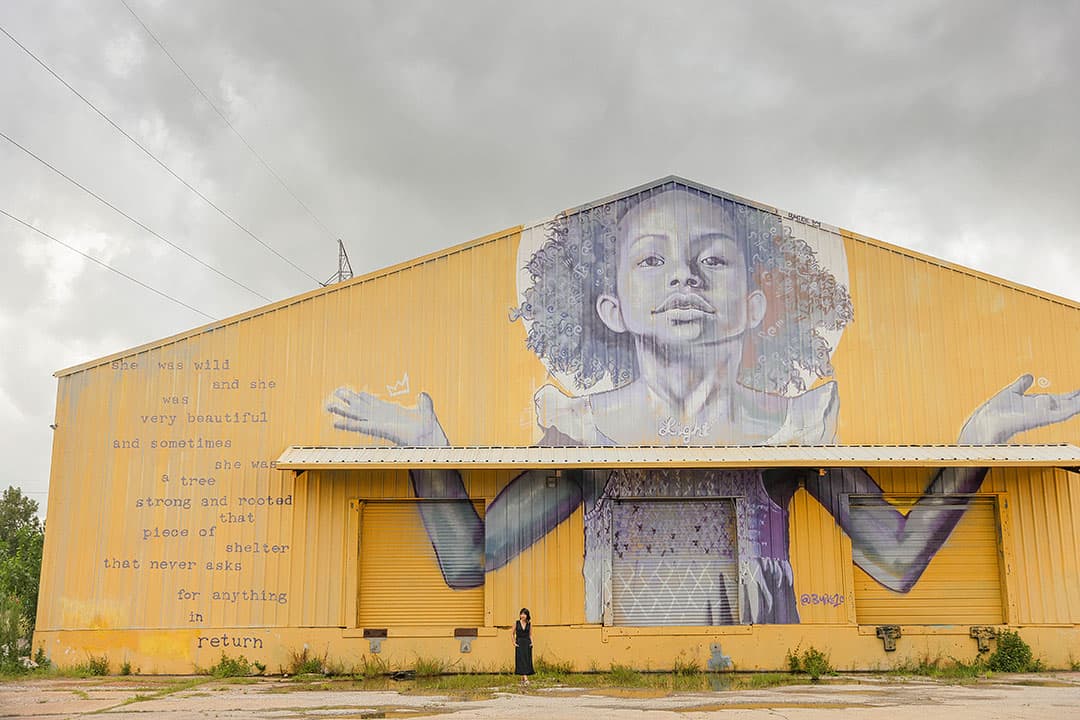
Looking for More THings to Do in New Orleans?
Don’t forget to check out our 101 things to do in New Orleans Bucket List if you’re looking for more ideas.
Weekend in New Orleans Map
Seasonal Things to Do in New Orleans
New Orleans has some epic festivals and seasonal activities. Here are some of the highlights (if you plan on attending any of these, be sure to book your hotels early):
- Mardi Gras (March)
- French Quarter Festival (April)
- New Orleans Jazz & Heritage Festival (April-May)
- Bayou Boogaloo (May)
- New Orleans Pride (June)
- New Orleans Wine and Food Experience (June)
- Essence Festival (July)
- Tales of the Cocktail (July)
- Satchmo Summerfest (July-August)
- French Market Creole Tomato Festival (July)
- Crescent City Blues and BBQ Festival (October)
Where to Eat for Your Weekend in New Orleans
The food pulls from French, West African, Cajun, Native American, Spanish, Sicilian, German, and Southern cultures. The locals mentioned that even if you’re looking for food that isn’t necessarily local, expect to see some local influence on their menus.
- Cafe du Monde, Multiple Locations (Coffee & Tea, Donuts, $) – Gotta try it at least once.
- Cafe Envie Espresso Bar, French Quarter (Breakfast & Brunch, $) – popular with locals and great for a quick bite or something to go.
- Gospel Coffee and Boozy Treats, Warehouse District (Breakfast & Brunch, $) – Another popular spot to grab breakfast.
- GW Fins, French Quarter (Seafood, $$$) – This is the special occasions restaurant in the city. It seemed like all the tables around us were celebrating something. Jacob’s favorite meal of the trip. Everything we ordered was delicious.
- Herbsaint, Warehouse District (French, $$$) – We didn’t get a chance to try food from the now-prolific restaurateur Donald Link but will next time.
- Parkway Bakery & Tavern, Bayou St. John (Sandwiches, $$) – Secret’s out that they have the best po’boys in New Orleans. Bit of a trek outside the normal tourist area, but if you’re headed to City Park, it’s on the way and so worth it. Oysters are only available two days a week.
- Peacock Room, Warehouse District (Cocktail Bars, $$) – Very grammable cocktail spot with live music in the evenings.
- Peche, Warehouse District (Seafood, $$$) – Gulf seafood in a cute spot.
- Superior Seafood & Oyster Bar, Touro (Seafood, $$) – Loved the oysters and Pecan Crusted Redfish
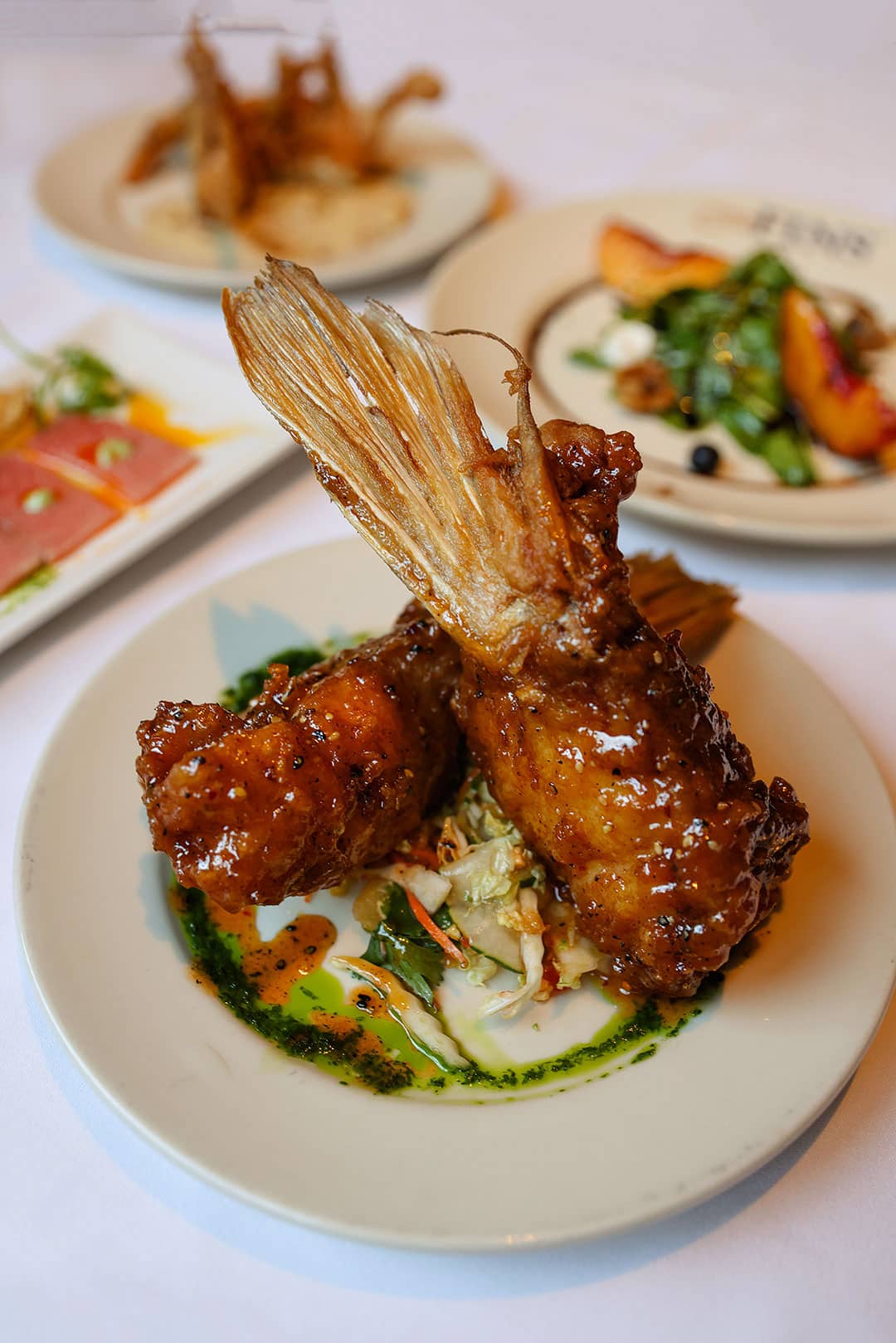

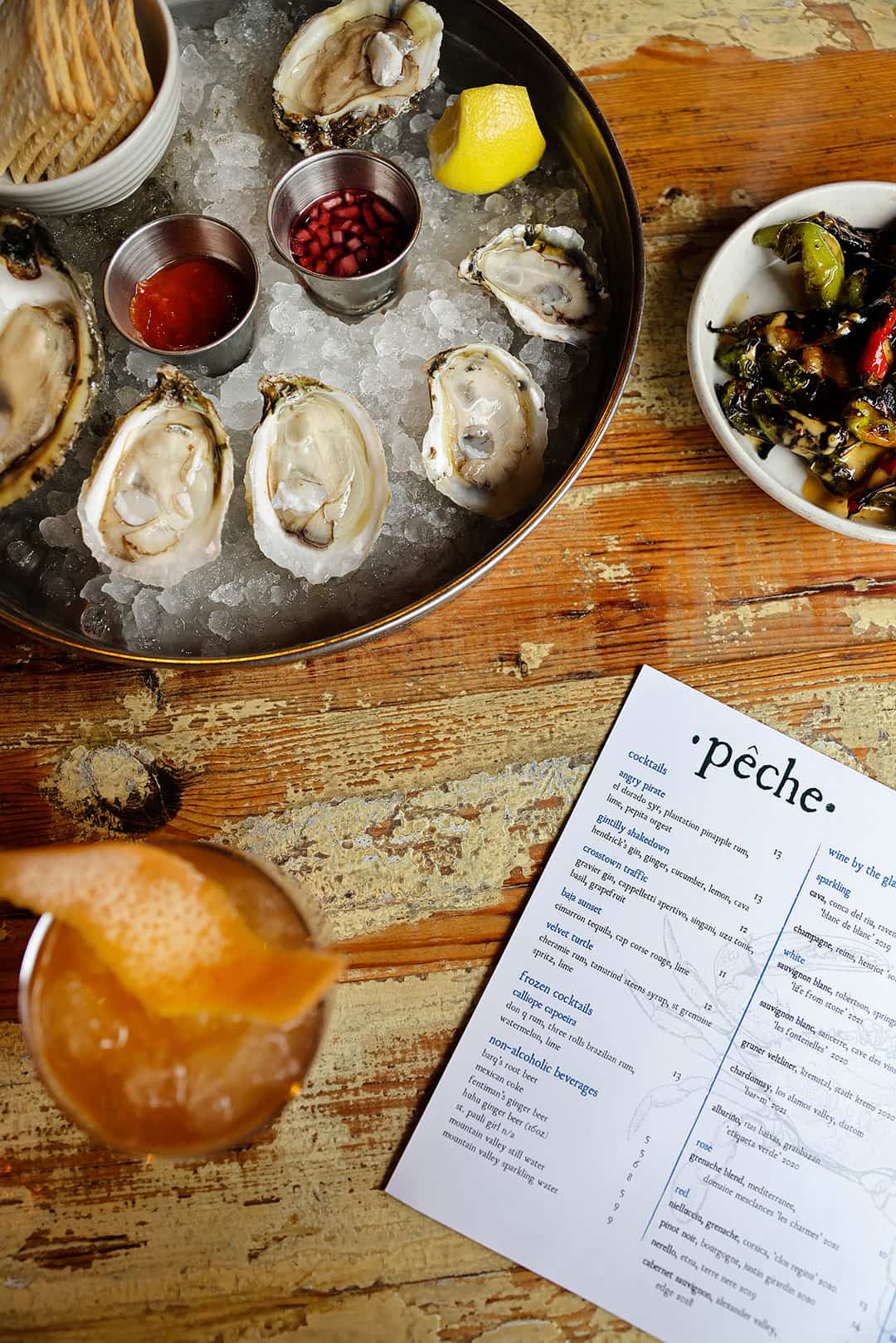
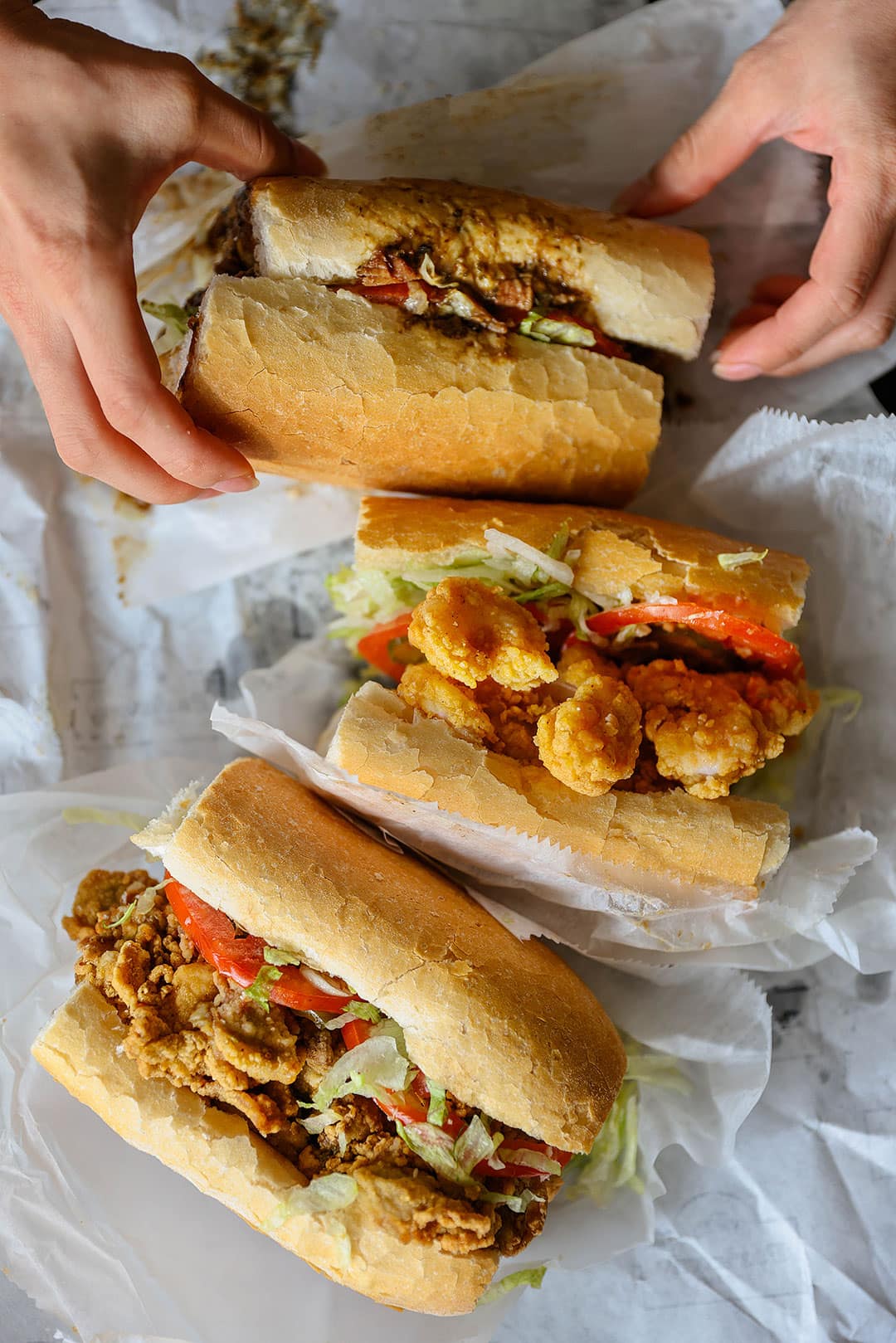
Essential Tips for YouR weekend in New Orleans
- Don’t forget your sunblock and bug spray. We got a lot of mosquito bites, especially at the parks.
- Don’t limit yourself to just the French Quarter. There’s so much to see in New Orleans.
- Bring a comfortable pair of walking shoes since it’s one of the best ways to explore the city. These are our fave, so we’re ready if it rains too.
- A raincoat is helpful, especially during hurricane season (June to November). Rain is common throughout the year.
- Bring some cash for streetcars, to tip the buskers or tour guides, and to use at certain shops.
- No open container laws – you can grab a drink and walk around (it can’t be glass).
- If you plan on visiting multiple attractions, get a Go City Card to save money.
- When to Visit – Temperatures vary quite a bit from season to season. Spring and Fall are the most pleasant times of year to visit. Hurricane Season is from June to November. September and November are the wettest times of the year, and historically the busiest times for strong hurricanes have been in August and September.
- Check Hours of Operation – A lot of the historical landmarks and museums and some restaurants are closed on Mondays.
- Want to know what to wear to the airport? Here’s my ideal airport outfit and our carry-on essentials for every flight.
Getting to and Around New Orleans
- By Plane: Louis Armstrong New Orleans International Airport (MSY) is relatively new and very nice. It was easy to fly in and out of and navigate. Once you arrive, you can rent a car, take the bus, or call an Uber or Lyft to town. Rideshare can cost anywhere from $25-40 depending on traffic.
- By Bus or Train: You can take Amtrack or the Greyhound to New Orleans and easily take the Streetcar line to many hotels and the downtown area.
- Streetcars: We talk about all the available lines with streetcars earlier. It’s a great easy, lost-cost way to get around town.
- Rideshare: Once you’re in town, you can get to most places around town for $10-15 via Uber or Lyft.
Best Places to Stay for Your Weekend in New Orleans
We stayed at the Kimpton Hotel Fontenot, which had a great location, friendly staff, and lovely facilities. We had a suite with plenty of space to stretch out and a beautiful view. It’s close enough to walk to the French Quarter but far enough away from the crowds and noise. Plus, we’ve always been a fan of Kimpton Hotels since they are pet friendly and treat our pets like special guests too. Next time we’ll have to bring our boys.
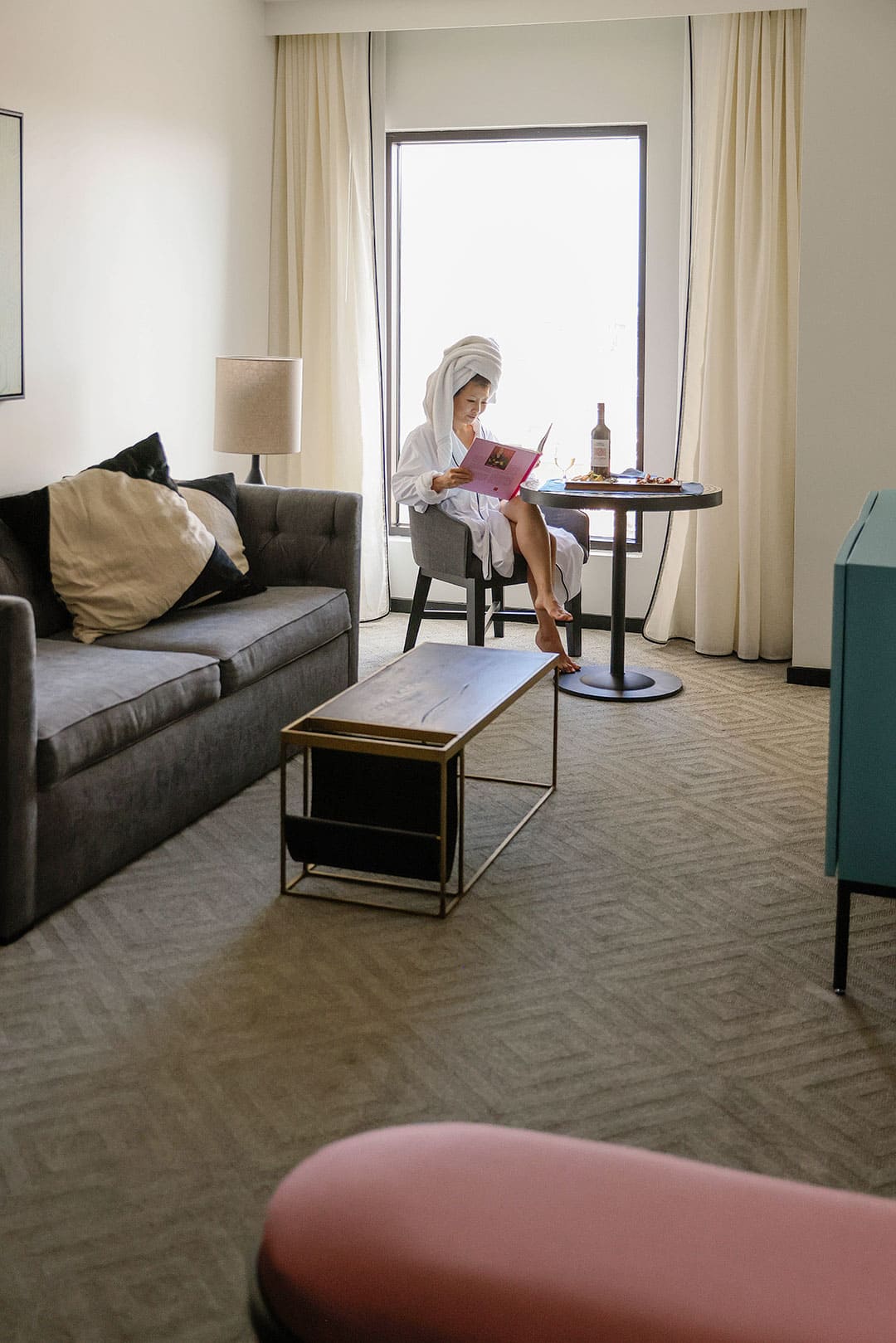
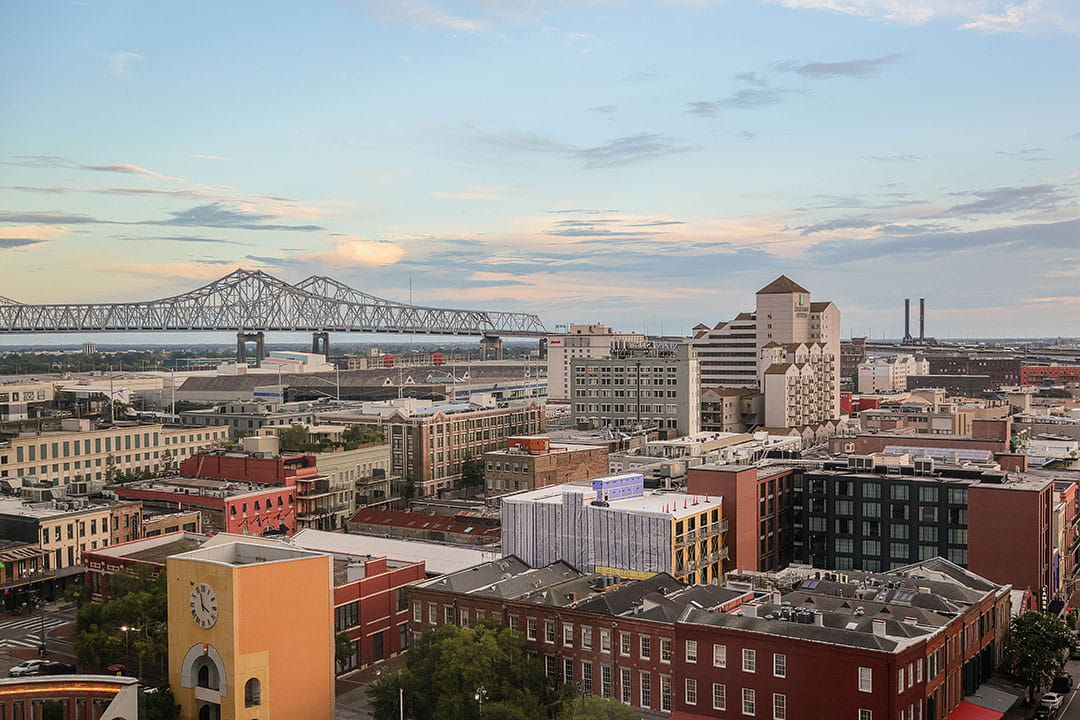
Weekend in New Orleans Frequently Asked Questions
How many days is enough for New Orleans? Can you visit New Orleans in a weekend?
It’s possible to see all the highlights in a weekend in New Orleans, but your days will be packed and exhausting. If you like to go at a more leisurely pace, we recommend 4-5 days.
How do people spend 3 days in New Orleans?
If you have a third day, these are our recommendations. See the above for day one and day two.
What should I avoid in New Orleans?
Don’t limit yourself to just the French Quarter. There is so much more to see in New Orleans. Also, don’t underestimate the weather. Be prepared with layers and proper rain gear.
What is the best month to go to New Orleans?
February to May or October to November has the best weather. December to January for the least busy time of year.
What is the cheapest month to go to New Orleans?
July and August are the cheapest months to fly to and stay in New Orleans since temperatures are high and it’s humid. The hurricane season also runs from June to November, with August and September historically having the most and strongest hurricanes.
Can you drink alcohol in public in New Orleans?
Yes, as long as it’s not in a glass bottle.
Is New Orleans worth visiting?
Absolutely! New Orleans is the city for you if you love music, food, booze, history, culture, and outdoor adventures.
Do you need a car when visiting New Orleans?
No. You can see a lot by walking, public transportation, and rideshare. We were pleasantly surprised by how much of the city is walkable.
Is it safe to walk around New Orleans?
Yes, but like any urban city, you should keep an eye out for your belongings in touristy areas and walk in groups at night. Just be smart, and you’ll stay safe.
Is New Orleans a walkable city?
Yes, surprisingly, a lot of what you’ll want to see is walkable. Walking and public transit are the best ways to explore the city.
What do I need to know before going to New Orleans?
It’s a walkable city, and rain is common throughout the year. See more travel tips here.
How much money do I need for a weekend in New Orleans?
There are many free activities in New Orleans, so you just need to budget enough for hotels and food.
Where should you not stay in New Orleans?
If you don’t have a car, stay near the French Quarter to explore that area. It will also keep you at the hub with the most Streetcar options. We liked staying in CBD because it was close enough to walk to the French Quarter but far enough from the noise.
Planning Checklist
- Get comprehensive insurance for your trip.
- Download these helpful language apps.
- Find a great deal on New Orleans hotels.
- Arrange a rental car for your trip.
- Book a tour for your visit.
- Get airport lounge access.
- Buy a travel charger to keep your devices charged.
- Get a new backpack for your trip.
- Buy a New Orleans travel guide.
- Pack the appropriate shoes for your trip.
- Don’t forget your in-flight essentials.
- Save money on attractions with Go City.
Have you been to New Orleans? What is your favorite thing to do in a new city?
Did you enjoy this post? Pin it for later



SEE More CITY Bucket Lists
⟡⟡⟡⟡⟡
“Discovery consists not of seeking new lands but in seeing with new eyes” – M. Proust

Esther + Jacob
Esther and Jacob are the founders of Local Adventurer, one of the top 5 travel blogs in the US. They believe that adventure can be found near and far and hope to inspire others to explore locally. They explore a new city in depth every year and currently base themselves in Las Vegas.
Follow on Instagram (E + J), YouTube, TikTok, and Pinterest.
